- Home
- Ann M. Martin
Better to Wish Page 4
Better to Wish Read online
Page 4
Abby looked out the window at the snow. The smell of gingerbread drifted up from the kitchen and she felt her stomach flip-flop with excitement. It was Christmastime and she was about to leave on her secret errand.
Getting out of the house was easier than she had thought it would be. She pulled on her outdoor clothes as fast as possible, called, “Going to Sarah’s,” over her shoulder, and ran out the door.
The route to Hammer’s took her through the pine woods, where she breathed in the scent of a thousand Christmas trees and stopped to watch snow fall on the deep green branches. A chickadee swooped ahead of her along the path. Abby scuffed through the snow and stuck out her tongue to catch snowflakes.
Eighty-nine cents, she thought. She hoped Mr. Hammer hadn’t raised the price of the tea set. Then she had another thought that made her stop in the middle of the woods and say, “Oh no!” aloud. She hadn’t been to Hammer’s in over a week. What if the tea set had been sold? What if someone was buying it at that very moment?
Abby quickened her pace. She emerged from the woods on the other side of the little spit of land, turned left, reached Lewisport Road, and hurried by Mr. Harrison’s fishing shack, and the falling-down house where Toby Hopper lived with his big brother and no parents, and then the house that belonged to Mr. Hammer and his wife. Finally, just beyond their house, was Hammer’s itself.
On this dark, snowy day the lighted window glowed warmly. Abby paused in front of it and pretended to inspect the electric train that ran around and around a jumbled display of cookware. She wanted to purchase the tea set as fast as possible, but she had to consider how to approach Mr. Hammer. She hated talking to him. He called her “little girl,” although he knew her name, and he never quite seemed to trust her. Abby was certain he was not going to be happy about counting out thirty-nine pennies, even if no one else was in the store.
At last Abby opened the door and stepped inside, brushing snow off of her coat sleeves and shaking more snow off of her hat. She stuffed her hat and mittens in her pocket and looked at the counter where Mr. Hammer was standing behind the wooden cash register, ringing up a sale of flour and sugar to Toby Hopper. The cash register dinged, the drawer opened, and Mr. Hammer deposited Toby’s dollar bill in the drawer and handed him his change. Toby dropped the change down into his boot, glanced awkwardly at Abby, and fled from the store.
“What can I help you with, little girl?” called Mr. Hammer as Abby made her way to the back of the store. “Don’t touch anything!”
“I won’t.” Abby squeezed her eyes shut as she approached the shelf with the display of cups and saucers. Then she opened them slowly. There were the adult-size cups, the adult-size saucers … and the tea set in a box.
Abby reached for it.
“No touching!” shouted Mr. Hammer, who had crept up behind her.
Abby jumped. “But,” she said, “but … I want to buy that. The tea set. It’s a present for Rose. My sister. And I have enough money. It’s all here.” She unbuttoned her coat and held out the fat change purse.
Mr. Hammer paused. “It costs eighty-nine cents.”
“I know. I’ve been saving.”
“I’d better go count it.” Mr. Hammer slid the tea set off the shelf, turned, and threaded his way to the front of the shop. Abby followed him, stopping only once to look at the horse and saddle.
When Mr. Hammer reached the counter, he placed the tea set on it and held out his hand. Abby emptied her coins into it. They spilled over the outstretched hand and onto the counter. Mr. Hammer muttered, “Jeez Louise,” and started counting.
“Eighty-seven, eighty-eight, eighty-nine,” he said a minute later.
Abby almost replied, “I told you so,” but she didn’t want to do anything to jinx Rose’s present.
Mr. Hammer didn’t say another word, but he did wrap each tiny cup and saucer, the teapot, and its lid in tissue paper. Then he placed all the little bundles back in the box and handed it to Abby.
“Thank you,” she whispered, and fled from the store.
She met Sarah halfway through the woods, the snow falling thickly now, the late morning nearly as dark as evening.
Abby thrust the box at her friend. “I got it! It was still there and I had exactly enough money. Thanks to your dime!”
Sarah opened her mouth, and then closed it again, and in that instant, Abby’s excitement rushed out of her like air from a pricked balloon. One of the advantages of having a best friend was being able to hold conversations without words, and Abby and Sarah had been best friends for a long time. So Abby knew something was wrong even before Sarah said, “That’s great, but, Abby, your father is looking for you. He’s mad.”
Abby took the box back and put it in her pocket. “Why is he mad?”
“You said you were going to my house, so he went looking for you there, and I didn’t know where you were.”
“Uh-oh. How mad is he?”
Sarah winced. She knew Pop’s temper almost as well as Abby and Rose did. “Mad. Just go home.”
Abby ran back through the woods ahead of Sarah. She met her father walking briskly along Blue Harbor Lane. He did not look happy.
“Where were you?” he demanded.
“I —” Abby began. She wanted badly to keep Rose’s gift a surprise until Christmas Day. “It’s a secret. But I didn’t do anything bad. Honest.”
“You disobeyed me.”
Abby didn’t remember Pop forbidding her to leave the house, but she said, “I’m sorry,” anyway.
“And you lied,” Pop went on. “You told your mother you were going to Sarah’s.”
“I’m sorry,” Abby said again. “I thought I would be back in time. And this is a really important secret. Not a bad thing. You’ll find out what it is. On Christmas Day.”
Pop looked at her with hard eyes. “No. Lying. Do you understand me?”
“Yes, sir.”
Abby’s punishment was that she wasn’t allowed to go with Pop, Mama, and Rose to choose the tree. But she found that she didn’t mind as much as she had thought she would. She sat by herself in the kitchen with Christmas carols playing on the Victrola, and she wrapped the tea set in red paper and tied the box with a white hair ribbon. Pop couldn’t stop her from doing that. He couldn’t control everything.
When Rose opened the box on Christmas morning, she burst into tears and asked Abby over and over how she had managed to get the tea set from the mean traveling-fair man. And when Rose was a grown-up — this was two decades later — she passed the tea set down to her own daughters one snowy Christmas morning and told them about the traveling fair and Mr. Hammer and Aunt Abby’s secret plan.
Abby woke with a start, and before she had opened her eyes, she thought, This is the last time I’ll wake up in this room. She decided to say her thought out loud: “This is the last time I’ll wake up in this room.”
“No, it isn’t,” said Rose from beside her.
Abby rolled over and looked at her sister. “I didn’t know you were up.”
“I can’t sleep.”
“Are you sad?”
“No, I’m happy! We don’t have to go to school today. Anyway, this is not the last time we’ll wake up in this room. You know this is going to be our beach cottage from now on. Pop said we can spend lots of time here in the summer.”
Pop, Abby thought, was the only Nichols who truly wanted to move to Barnegat Point, into the second-largest house on their new street. He was proud of this accomplishment, but Abby didn’t want to leave Blue Harbor Lane, and neither did Mama. Rose was excited about the new house, but really, Rose was happy wherever she was.
“I know,” said Abby. “But it won’t be the same. Our real house will be in Barnegat Point. We’ll wake up there most mornings — and what will I see when I look out my window?”
Rose shrugged. A view was a view. She wasn’t sure why Abby cared so much about it. “I don’t know. What?”
“Well, I don’t know either. But it won’t be the ocean. It
will probably just be the house next door.”
Rose shrugged again.
“Won’t you miss the ocean?” Abby asked. She couldn’t imagine living without the sound of the waves, a sound as natural to her as a heartbeat.
“I guess. But, Abby, we get to live in town. In a big house! We’ll each have our own room. Even the baby will have its own room, after it’s born. And there are two bathrooms. And a dining room. And a parlor.” Rose paused. “What’s a parlor anyway?”
It’s a room for people who want to show off that they’re rich, Abby thought. But what she said was, “It’s like a living room, but I think it’s fancier and you’re supposed to entertain guests in it.”
“Well, whatever it is, I don’t care. We don’t have to go to school today!”
Abby sighed. She knew that eventually she’d get used to the idea of the fancy house in Barnegat Point, but she would miss the cottage by the sea.
“Girls!” called Mama from downstairs. “Hurry up now. Today is a big day!”
The move to Barnegat Point was going to be easy. Abby remembered when the Becketts had moved into the cottage next door. Every stick of their furniture and all their belongings had been packed in a truck and it had taken hours to unload everything. But the Nicholses were leaving most of their belongings in the cottage that would become their beach house, and Mama and Pop had bought all new things for the house in town. Abby and Rose would need to unpack their clothes and organize their rooms, but that was about it.
Abby, wearing a pale blue dress (a present for her tenth birthday) and matching blue socks, clattered downstairs in her lace-up shoes and found Mama standing at the back window, hands resting on her spreading belly, watching Pop as he supervised the digging up of the rosebushes, which would be making the trip to the new yard in Barnegat Point.
“Eat something quickly,” said Mama, turning from the window. “Your father wants us in the car in half an hour.”
Abby wondered whether Pop was more excited about the new house or the new baby. It was a thought she kept to herself.
Fifteen minutes later, Abby said a secret good-bye to Orrin. She found him on the beach in front of his house, standing ankle deep in frigid seawater, staring at the horizon.
“I’ll see you every day in school, you know,” she told him.
Orrin nodded. “But still. Everything is going to change. Now we’ll only get to see each other in school. What are we going to do all summer?”
Abby sighed. “We’ll figure something out. We’ll still come back here. We’re keeping our old house.”
Orrin shrugged. “It won’t be the same.”
“I know.”
When Orrin said nothing more, Abby leaned forward, kissed him on the cheek as quick as the flash of a lightning bug, and fled from the beach. She was not about to let Orrin Umhay see her cry.
Her secret good-bye with Orrin was followed by a regular good-bye with Sarah, and she started off by telling her what she’d told Orrin earlier: “We’ll still get to see each other in school.”
Sarah was already blinking back tears. “I’m going to miss you anyway. You’ve lived three doors away from me for as long as I can remember.”
“Well,” said Abby, drawing a handkerchief from her pocket and swiping at her eyes, “now you can come to Barnegat Point to visit me. And some days maybe you can come home with me after school. We can be town girls. We can go to the movies and get ice cream and look in the stores.”
“But it won’t be as good as having you here all the time.”
Abby reached for Sarah, gave her a fast, fierce hug, and ran down Blue Harbor Lane.
“See you in school tomorrow!” Sarah called after her.
Abby waved over her shoulder. And in no time, it seemed, Pop was swinging the Nicholses’ new Buick Roadster onto Haddon Road in Barnegat Point. Abby, even though she had been on Haddon many times, scrambled over Rose for a better look at the house that was now their home.
“It’s so big,” said Rose softly.
“I know,” Abby replied. And their new house (which was actually almost fifteen years old) was big. But it was not the biggest house on the street. And it certainly wasn’t as big as the summer houses on the beach, the houses for the people from New York and Boston. But still.
Pop passed the house that was the largest on the street, the one with two turrets and three floors, and turned into the drive next door.
You could fit our old house and Sarah’s house right down inside our new one, Abby thought, and still have plenty of space left over.
Pop parked the Buick at the top of the drive, and Abby and Rose jumped out of the car and ran through the front door of the house. They were greeted by Ellen, a cheerful, rosy-cheeked woman, older than Mama, who was wearing a white apron over a gray dress. Ellen was their new housekeeper, something Mama said she would never, ever get used to.
“You mean we won’t have to make our beds?” Abby had asked when Pop had announced that he’d hired Ellen — along with Mike, who was to help with the yard and the Buick, and Sheila, who was to help Ellen until the baby came. Then she would be the baby’s nurse.
“I mean no such thing at all,” said Mama. “You girls still have your chores.”
Pop had frowned at Mama. “For heaven’s sake, Nell,” he’d said. “I can afford help now. You don’t think Stuart Burley makes his kids do chores, do you?” Stuart Burley owned the two-turreted house next door. “Burley’s got help, just like us. That’s what people do when they have this much money. They hire help so their wives don’t have to cook and clean, and their kids can hold their heads up when they walk into town.”
Mama had said nothing to this. But now she called Abby and Rose back outside. “Before you do anything else, girls, you need to unpack your clothes.”
Pop threw Mama an angry look and turned back to Abby and Rose. “And then you have the rest of the day off.”
“Gosh, we could have gone to school,” Abby said.
Rose pinched her arm and Abby squeaked, but said nothing further.
“Mike will bring your suitcases inside,” Pop added pointedly.
While she waited for the suitcases, Abby walked cautiously through the rooms on the ground floor of the house. The front door opened into a hall, and through the first door on the left was what Pop said was the parlor, the entertaining room. It was furnished with pieces from Barnegat Interior, and with chairs and tables from Pop’s own company. Across the hall from the parlor was a similar room, just not quite as fancy, and in the back of the house were the kitchen, the dining room, and Pop’s study.
“What do you think he’s going to study?” Rose asked Abby as they peeped through the door.
“Nothing. It’s like an office.”
“It doesn’t look like an office. It looks like a library. Except with no books on the shelves. I’ve never seen a desk like that in an office.” Rose eyed the rolltop desk that had also come from Pop’s company.
“Well, it’s still an office.”
Abby left Rose, walked back to the hall, and began to climb the stairs to the second floor. The staircase didn’t curve like a snail shell, the way the one in the summer house did, but there was a landing partway up where Pop said they should put a table with a statue on it. At the top of the stairs was another hall, and from this opened the doors to the four bedrooms — Abby’s room, Rose’s room, Mama and Pop’s room, and the baby’s room.
Abby walked slowly into her room and across to the window. She stood with her eyes closed, then finally opened them and found herself staring at the side of the Burleys’ house and an upstairs window. It was a very nice house and window. But it wasn’t the ocean.
Abby sighed. She bounced once on her new bed, trailed her fingers across her new vanity, sat briefly in her new rocking chair, and peeked into the empty closet.
Rose appeared in the hallway. “Let’s see if we’re allowed to walk into town by ourselves,” she said.
“All right. But we can’t ask un
til we’ve unpacked.” Abby knew Mama wouldn’t want her and Rose to have a treat until they’d fulfilled their duties. More important, Abby felt she couldn’t leave her strange new room until she had made it her own.
Mama balked when Abby and Rose asked to walk into town without a grown-up.
“It’s only two blocks,” Abby protested.
“Children aren’t safe anymore,” said Mama, and Abby thought of the newspaper headline she’d seen the other day: Lindbergh Baby Found Slain. The baby, the son of the famous aviator Charles Lindbergh, had been kidnapped from his crib in the middle of the night on March 1st. On May 12th, the baby had been found not far from his home in New Jersey — dead. Someone had killed him. Mama had wept when she’d heard the news. And she’d said that children weren’t safe anymore, not even in their own beds. She had said that many times in the past few days, occasionally adding, “What is the world coming to?”
“But can’t we just walk into town?” Abby asked again. “We aren’t babies. And we know where we’re going. Anyway, starting tomorrow we’re going to be walking to school by ourselves.”
Mama finally relented, but only after Pop said, “We can’t coddle them forever, Nell.”
“Thank you!” Abby and Rose cried before Mama could change her mind. They ran across their front lawn, stopping briefly to watch Mike, who was replanting the rosebushes, and who kept his eyes on his work.
“Do you know the way into town?” Rose asked Abby as they passed the Burleys’ house.
“Of course. Right up there is the main street,” Abby said, pointing. “The one with all the stores —”
“Let’s go to the drugstore,” Rose interrupted, “and get ice cream.”
“Let’s look around a little first. Gosh, I can’t believe we live in town now. And that we can just walk right to the drugstore or the toy store or the library whenever we want. We’ll walk into town every single day on our way to school and back.”

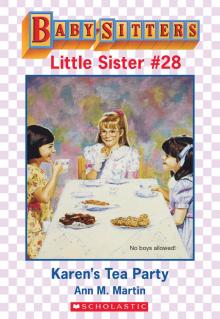 Karen's Tea Party
Karen's Tea Party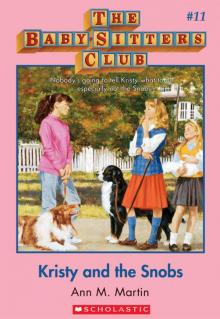 Kristy and the Snobs
Kristy and the Snobs Best Kept Secret
Best Kept Secret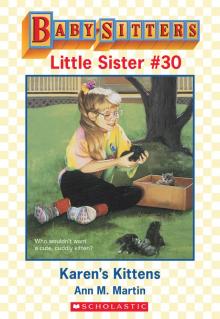 Karen's Kittens
Karen's Kittens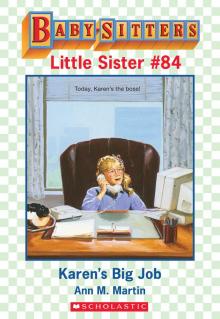 Karen's Big Job
Karen's Big Job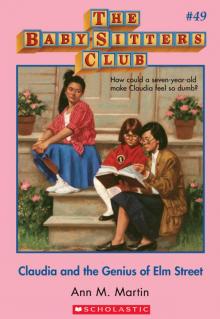 Claudia and the Genius of Elm Street
Claudia and the Genius of Elm Street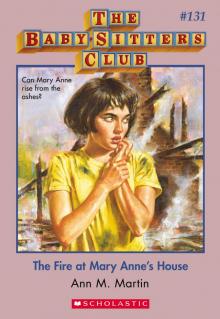 The Fire at Mary Anne's House
The Fire at Mary Anne's House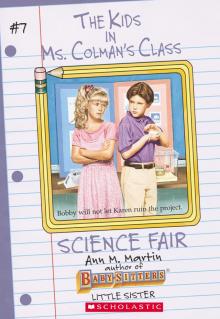 Science Fair
Science Fair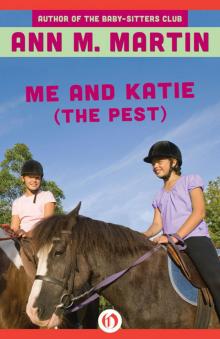 Me and Katie (The Pest)
Me and Katie (The Pest)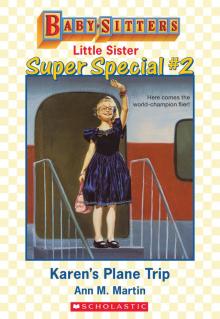 Karen's Plane Trip
Karen's Plane Trip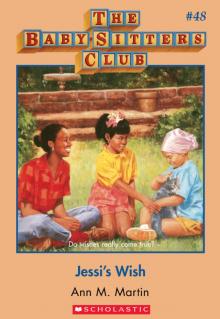 Jessi's Wish
Jessi's Wish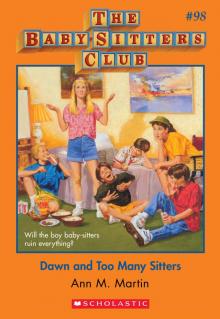 Dawn and Too Many Sitters
Dawn and Too Many Sitters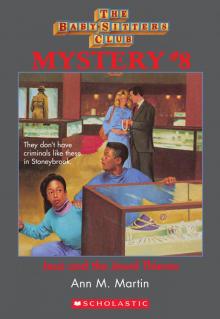 Jessi and the Jewel Thieves
Jessi and the Jewel Thieves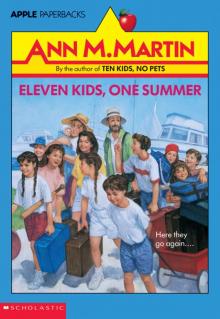 Eleven Kids, One Summer
Eleven Kids, One Summer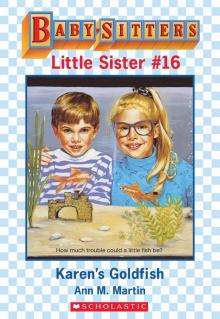 Karen's Goldfish
Karen's Goldfish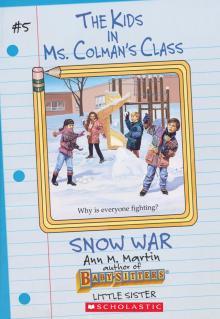 Snow War
Snow War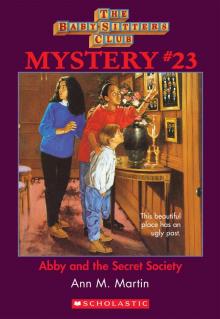 Abby and the Secret Society
Abby and the Secret Society Keeping Secrets
Keeping Secrets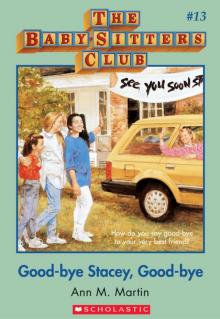 Good-Bye Stacey, Good-Bye
Good-Bye Stacey, Good-Bye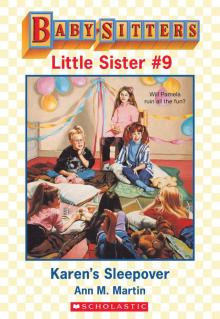 Karen's Sleepover
Karen's Sleepover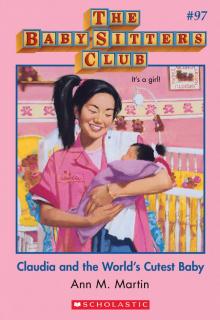 Claudia and the World's Cutest Baby
Claudia and the World's Cutest Baby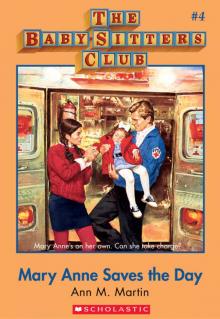 Mary Anne Saves the Day
Mary Anne Saves the Day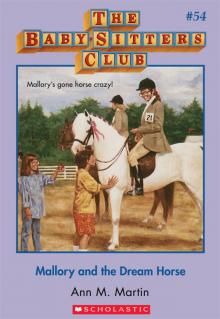 Mallory and the Dream Horse
Mallory and the Dream Horse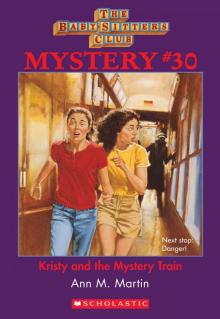 Kristy and the Mystery Train
Kristy and the Mystery Train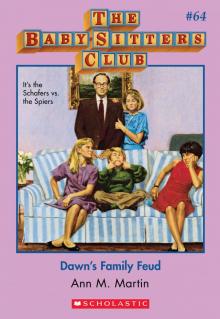 Dawn's Family Feud
Dawn's Family Feud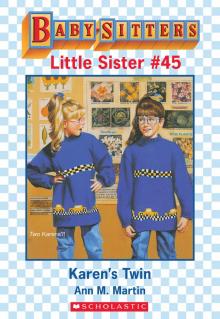 Karen's Twin
Karen's Twin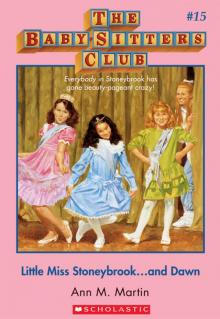 Little Miss Stoneybrook... And Dawn
Little Miss Stoneybrook... And Dawn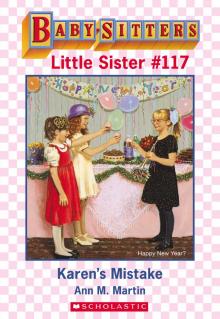 Karen's Mistake
Karen's Mistake Karen's Movie Star
Karen's Movie Star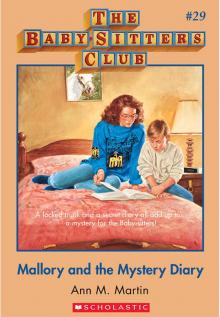 Mallory and the Mystery Diary
Mallory and the Mystery Diary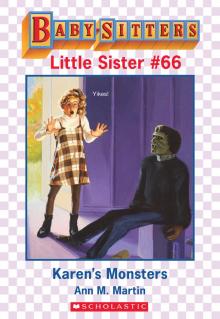 Karen's Monsters
Karen's Monsters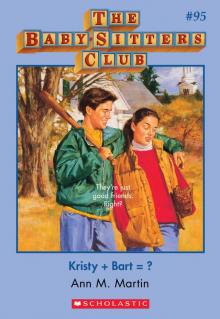 Kristy + Bart = ?
Kristy + Bart = ?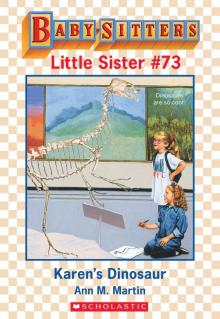 Karen's Dinosaur
Karen's Dinosaur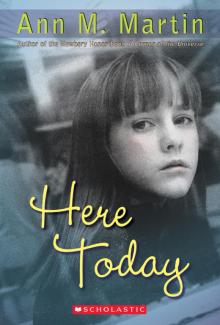 Here Today
Here Today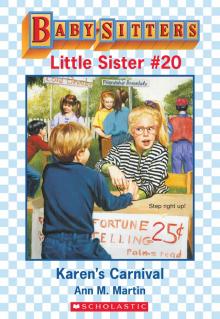 Karen's Carnival
Karen's Carnival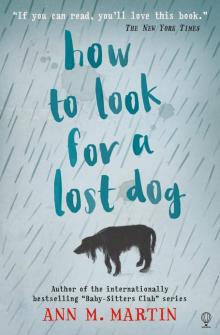 How to Look for a Lost Dog
How to Look for a Lost Dog Stacey vs. Claudia
Stacey vs. Claudia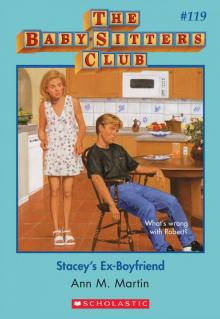 Stacey's Ex-Boyfriend
Stacey's Ex-Boyfriend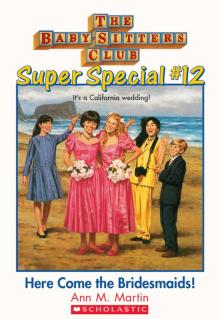 Here Come the Bridesmaids!
Here Come the Bridesmaids! Graduation Day
Graduation Day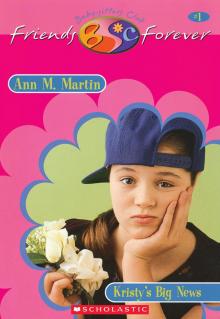 Kristy's Big News
Kristy's Big News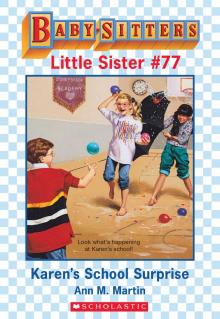 Karen's School Surprise
Karen's School Surprise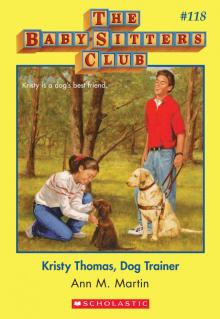 Kristy Thomas, Dog Trainer
Kristy Thomas, Dog Trainer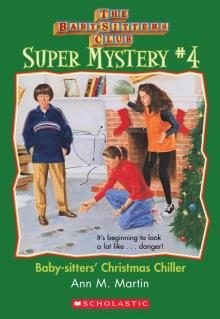 Baby-Sitters' Christmas Chiller
Baby-Sitters' Christmas Chiller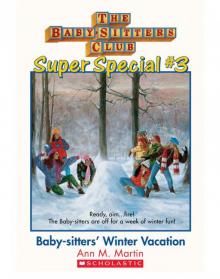 Baby-Sitters' Winter Vacation
Baby-Sitters' Winter Vacation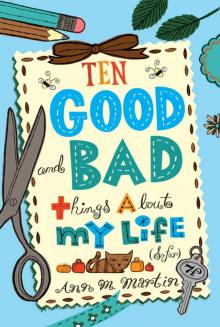 Ten Good and Bad Things About My Life
Ten Good and Bad Things About My Life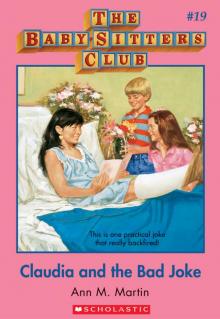 Claudia and the Bad Joke
Claudia and the Bad Joke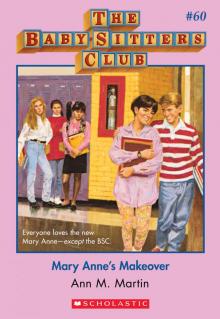 Mary Anne's Makeover
Mary Anne's Makeover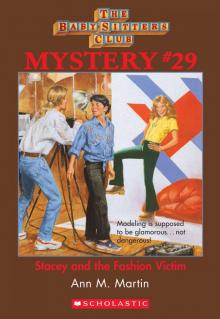 Stacey and the Fashion Victim
Stacey and the Fashion Victim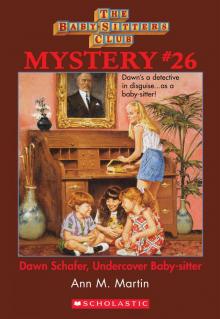 Dawn Schafer, Undercover Baby-Sitter
Dawn Schafer, Undercover Baby-Sitter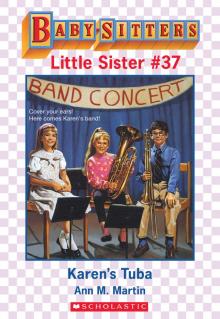 Karen's Tuba
Karen's Tuba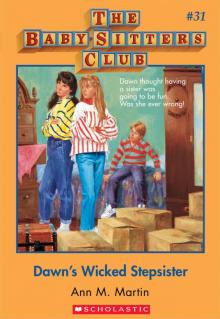 Dawn's Wicked Stepsister
Dawn's Wicked Stepsister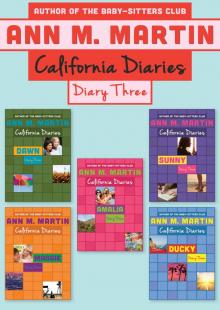 Diary Three: Dawn, Sunny, Maggie, Amalia, and Ducky
Diary Three: Dawn, Sunny, Maggie, Amalia, and Ducky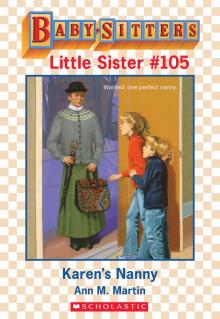 Karen's Nanny
Karen's Nanny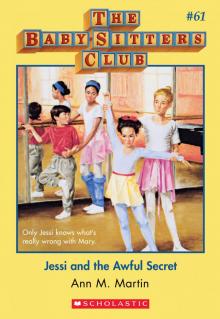 Jessi and the Awful Secret
Jessi and the Awful Secret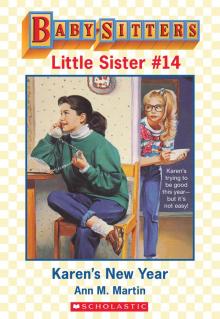 Karen's New Year
Karen's New Year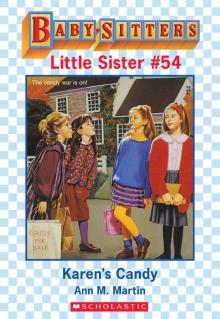 Karen's Candy
Karen's Candy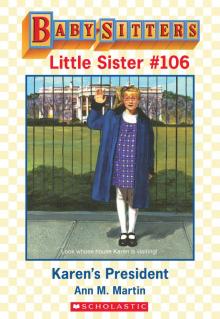 Karen's President
Karen's President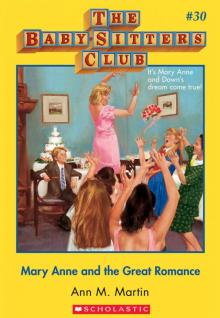 Mary Anne and the Great Romance
Mary Anne and the Great Romance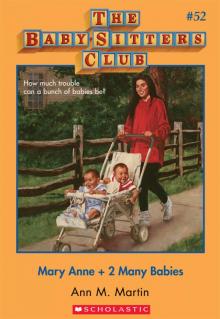 Mary Anne + 2 Many Babies
Mary Anne + 2 Many Babies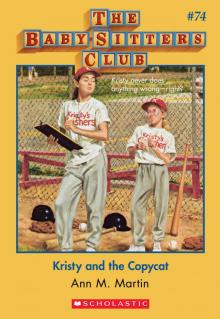 Kristy and the Copycat
Kristy and the Copycat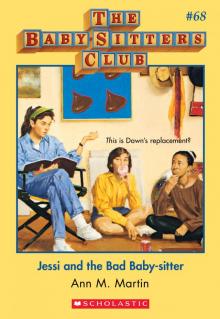 Jessi and the Bad Baby-Sitter
Jessi and the Bad Baby-Sitter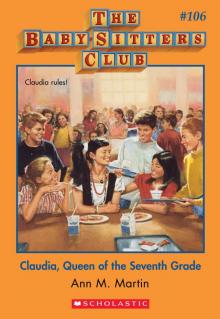 Claudia, Queen of the Seventh Grade
Claudia, Queen of the Seventh Grade Claudia and the Lighthouse Ghost
Claudia and the Lighthouse Ghost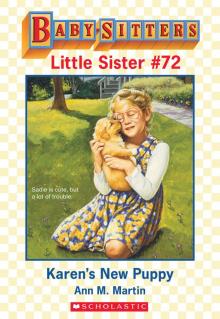 Karen's New Puppy
Karen's New Puppy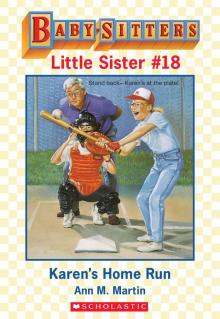 Karen's Home Run
Karen's Home Run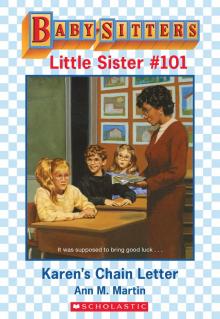 Karen's Chain Letter
Karen's Chain Letter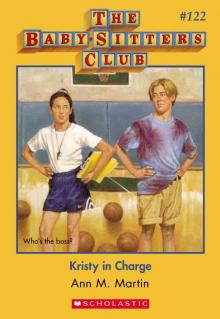 Kristy in Charge
Kristy in Charge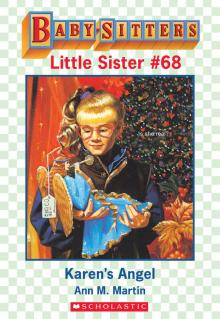 Karen's Angel
Karen's Angel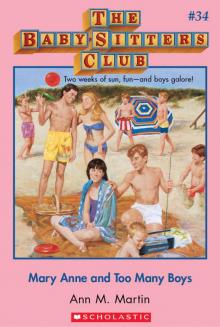 Mary Anne and Too Many Boys
Mary Anne and Too Many Boys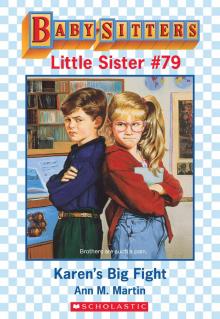 Karen's Big Fight
Karen's Big Fight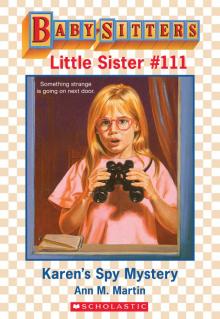 Karen's Spy Mystery
Karen's Spy Mystery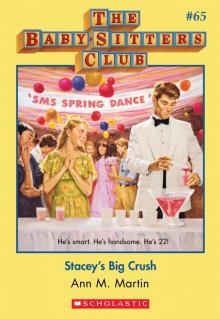 Stacey's Big Crush
Stacey's Big Crush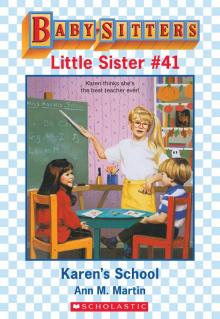 Karen's School
Karen's School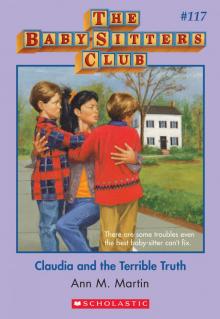 Claudia and the Terrible Truth
Claudia and the Terrible Truth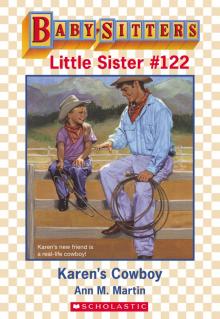 Karen's Cowboy
Karen's Cowboy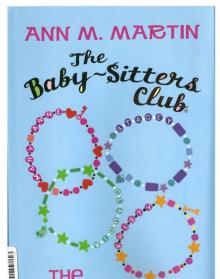 The Summer Before
The Summer Before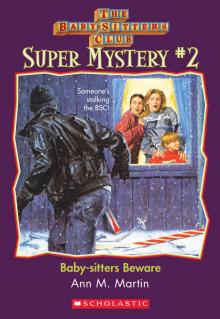 Beware, Dawn!
Beware, Dawn!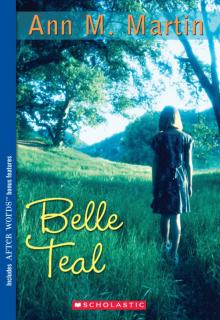 Belle Teale
Belle Teale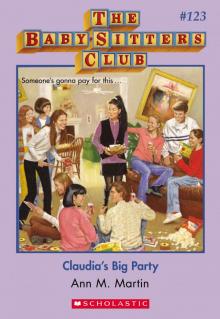 Claudia's Big Party
Claudia's Big Party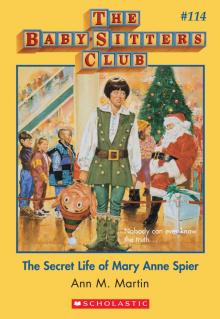 The Secret Life of Mary Anne Spier
The Secret Life of Mary Anne Spier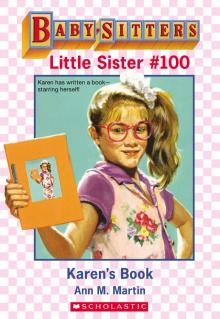 Karen's Book
Karen's Book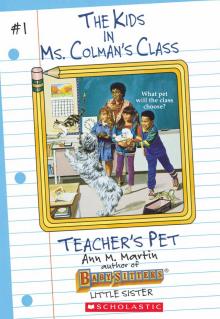 Teacher's Pet
Teacher's Pet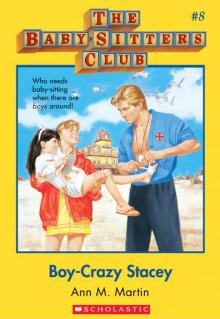 Boy-Crazy Stacey
Boy-Crazy Stacey Claudia and the Disaster Date
Claudia and the Disaster Date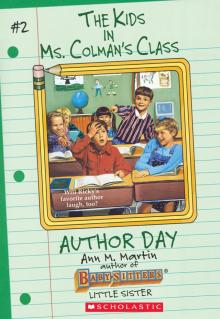 Author Day
Author Day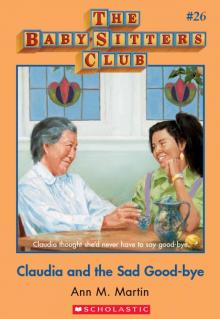 Claudia and the Sad Good-Bye
Claudia and the Sad Good-Bye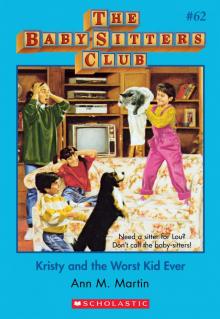 Kristy and the Worst Kid Ever
Kristy and the Worst Kid Ever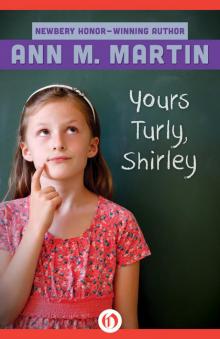 Yours Turly, Shirley
Yours Turly, Shirley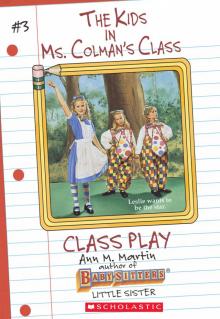 Class Play
Class Play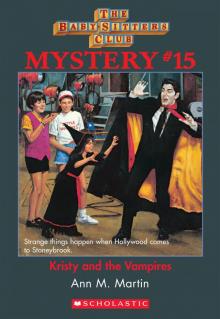 Kristy and the Vampires
Kristy and the Vampires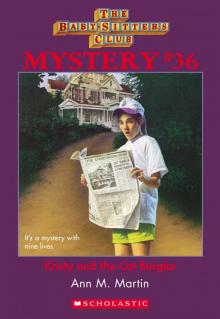 Kristy and the Cat Burglar
Kristy and the Cat Burglar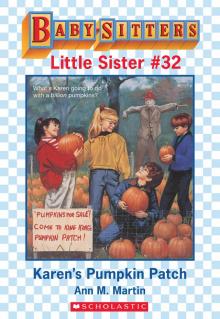 Karen's Pumpkin Patch
Karen's Pumpkin Patch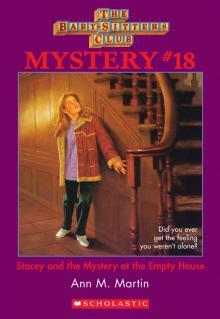 Stacey and the Mystery at the Empty House
Stacey and the Mystery at the Empty House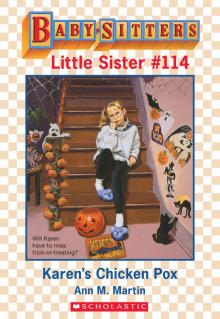 Karen's Chicken Pox
Karen's Chicken Pox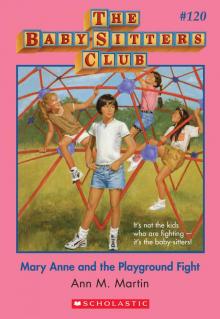 Mary Anne and the Playground Fight
Mary Anne and the Playground Fight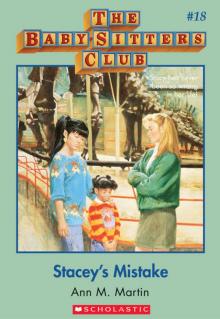 Stacey's Mistake
Stacey's Mistake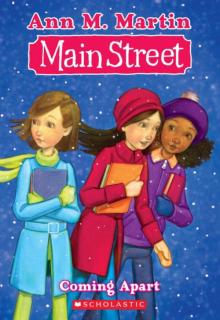 Coming Apart
Coming Apart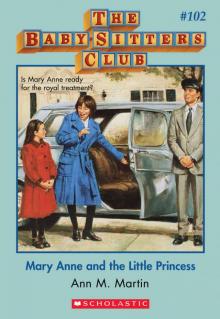 Mary Anne and the Little Princess
Mary Anne and the Little Princess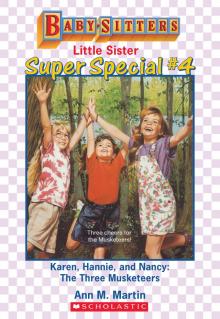 Karen, Hannie and Nancy: The Three Musketeers
Karen, Hannie and Nancy: The Three Musketeers 'Tis the Season
'Tis the Season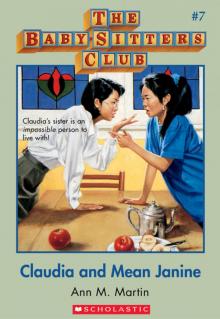 Claudia and Mean Janine
Claudia and Mean Janine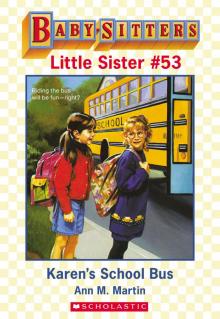 Karen's School Bus
Karen's School Bus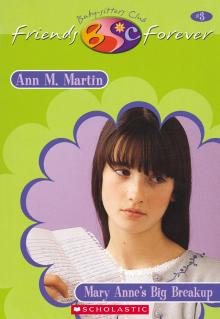 Mary Anne's Big Breakup
Mary Anne's Big Breakup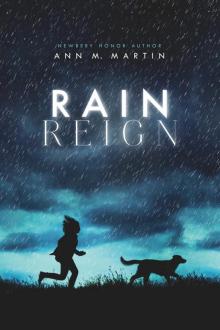 Rain Reign
Rain Reign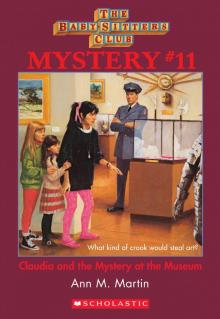 Claudia and the Mystery at the Museum
Claudia and the Mystery at the Museum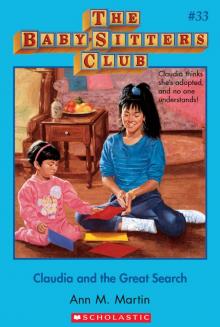 Claudia and the Great Search
Claudia and the Great Search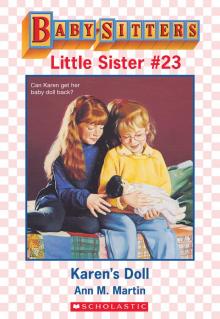 Karen's Doll
Karen's Doll Shannon's Story
Shannon's Story Sea City, Here We Come!
Sea City, Here We Come!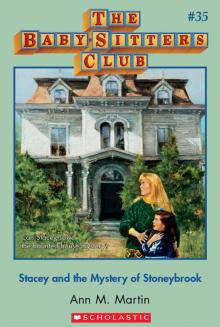 Stacey and the Mystery of Stoneybrook
Stacey and the Mystery of Stoneybrook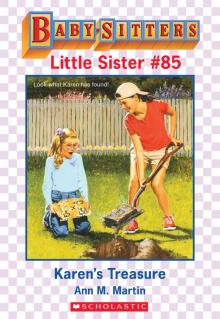 Karen's Treasure
Karen's Treasure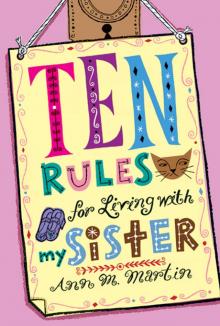 Ten Rules for Living With My Sister
Ten Rules for Living With My Sister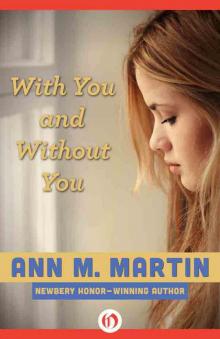 With You and Without You
With You and Without You Baby-Sitters' Island Adventure
Baby-Sitters' Island Adventure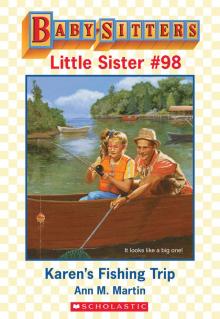 Karen's Fishing Trip
Karen's Fishing Trip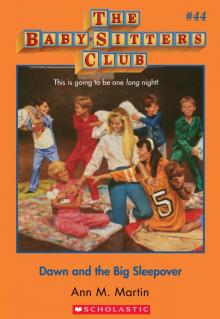 Dawn and the Big Sleepover
Dawn and the Big Sleepover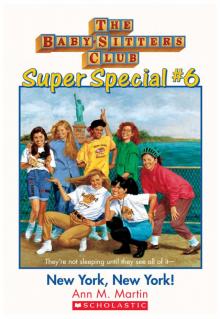 New York, New York!
New York, New York!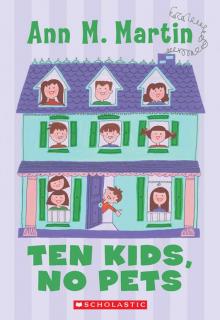 Ten Kids, No Pets
Ten Kids, No Pets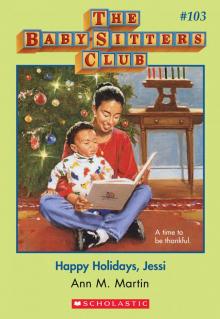 Happy Holidays, Jessi
Happy Holidays, Jessi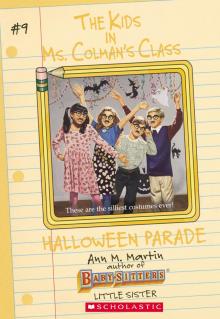 Halloween Parade
Halloween Parade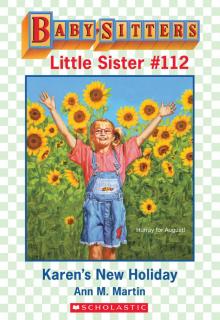 Karen's New Holiday
Karen's New Holiday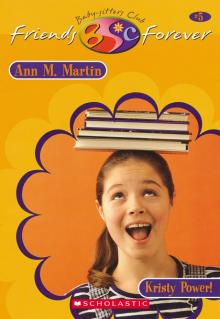 Kristy Power!
Kristy Power!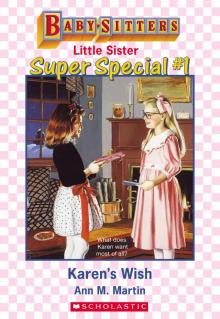 Karen's Wish
Karen's Wish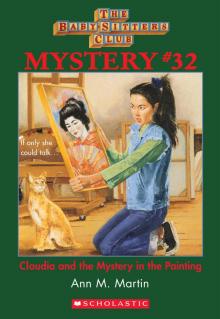 Claudia and the Mystery in the Painting
Claudia and the Mystery in the Painting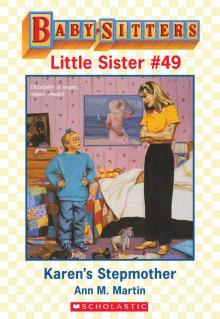 Karen's Stepmother
Karen's Stepmother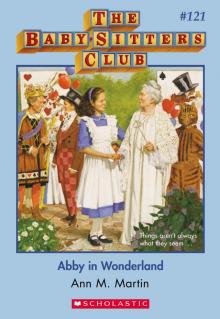 Abby in Wonderland
Abby in Wonderland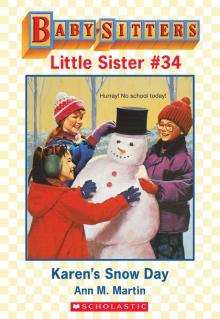 Karen's Snow Day
Karen's Snow Day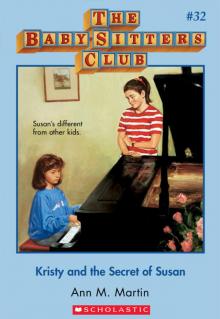 Kristy and the Secret of Susan
Kristy and the Secret of Susan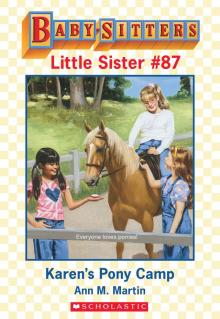 Karen's Pony Camp
Karen's Pony Camp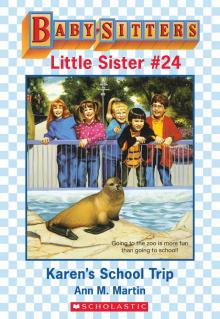 Karen's School Trip
Karen's School Trip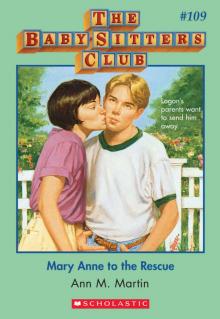 Mary Anne to the Rescue
Mary Anne to the Rescue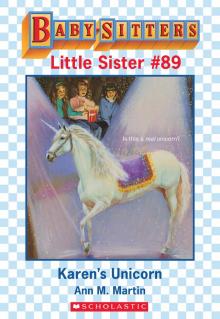 Karen's Unicorn
Karen's Unicorn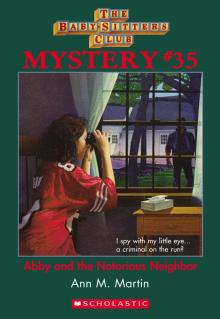 Abby and the Notorious Neighbor
Abby and the Notorious Neighbor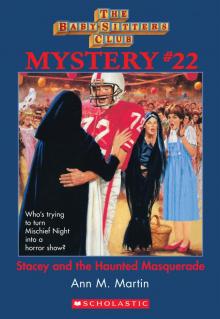 Stacey and the Haunted Masquerade
Stacey and the Haunted Masquerade Claudia Gets Her Guy
Claudia Gets Her Guy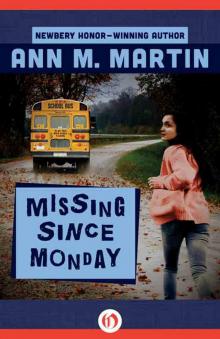 Missing Since Monday
Missing Since Monday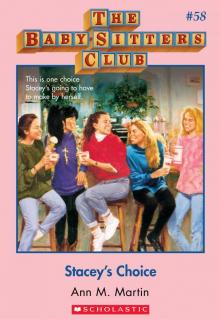 Stacey's Choice
Stacey's Choice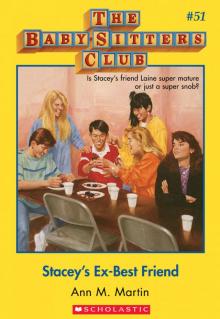 Stacey's Ex-Best Friend
Stacey's Ex-Best Friend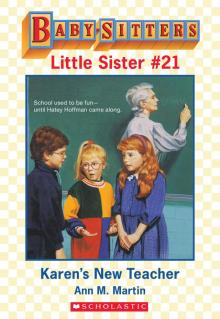 Karen's New Teacher
Karen's New Teacher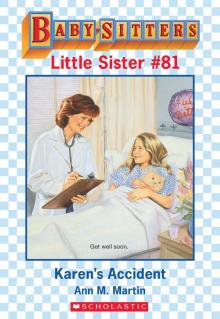 Karen's Accident
Karen's Accident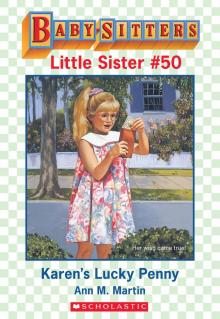 Karen's Lucky Penny
Karen's Lucky Penny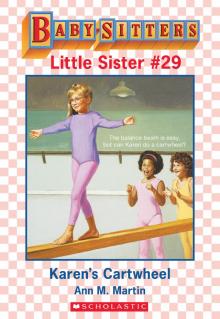 Karen's Cartwheel
Karen's Cartwheel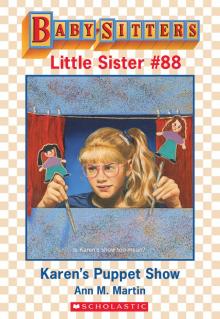 Karen's Puppet Show
Karen's Puppet Show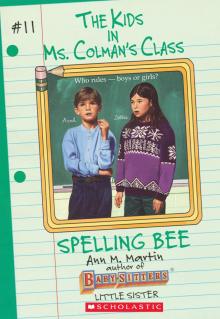 Spelling Bee
Spelling Bee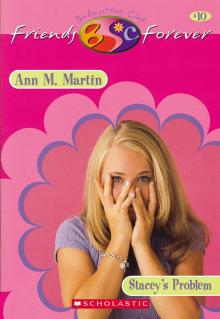 Stacey's Problem
Stacey's Problem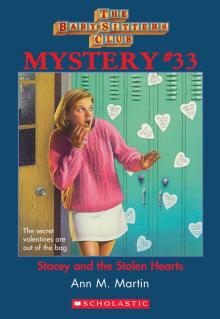 Stacey and the Stolen Hearts
Stacey and the Stolen Hearts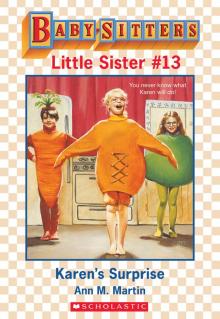 Karen's Surprise
Karen's Surprise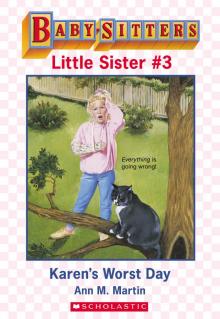 Karen's Worst Day
Karen's Worst Day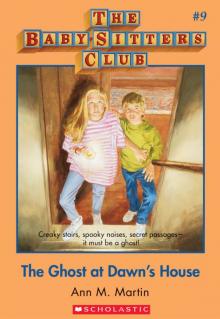 The Ghost at Dawn's House
The Ghost at Dawn's House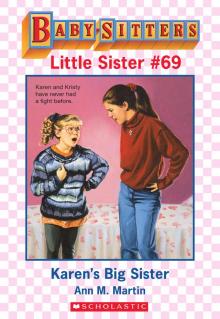 Karen's Big Sister
Karen's Big Sister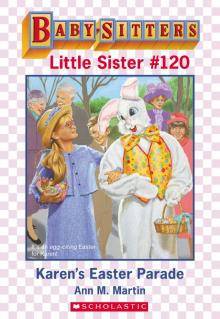 Karen's Easter Parade
Karen's Easter Parade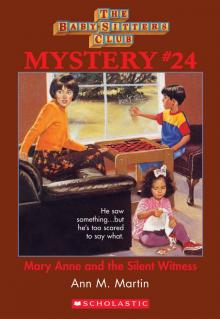 Mary Anne and the Silent Witness
Mary Anne and the Silent Witness Karen's Swim Meet
Karen's Swim Meet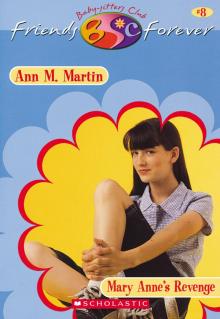 Mary Anne's Revenge
Mary Anne's Revenge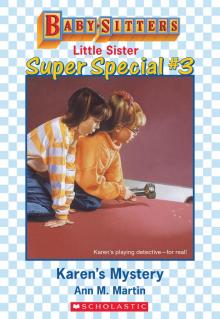 Karen's Mystery
Karen's Mystery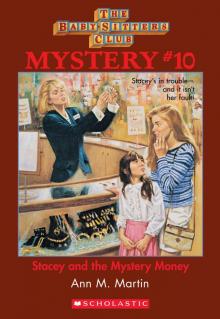 Stacey and the Mystery Money
Stacey and the Mystery Money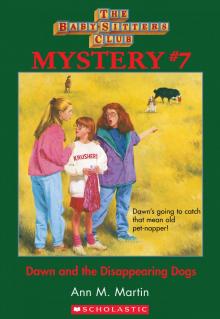 Dawn and the Disappearing Dogs
Dawn and the Disappearing Dogs Karen's Christmas Tree
Karen's Christmas Tree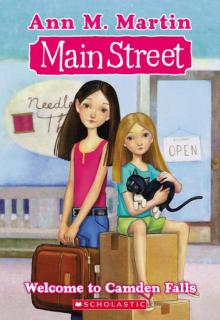 Welcome to Camden Falls
Welcome to Camden Falls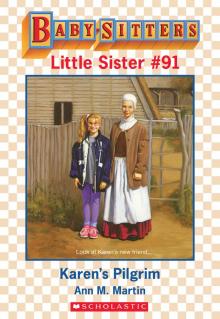 Karen's Pilgrim
Karen's Pilgrim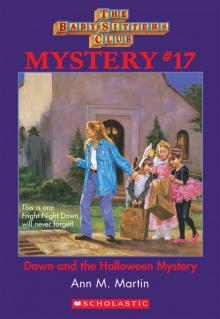 Dawn and the Halloween Mystery
Dawn and the Halloween Mystery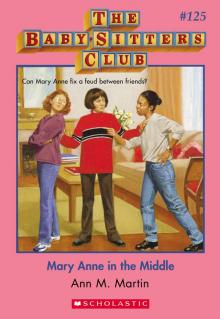 Mary Anne in the Middle
Mary Anne in the Middle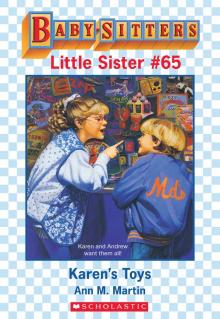 Karen's Toys
Karen's Toys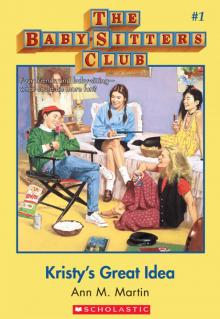 Kristy's Great Idea
Kristy's Great Idea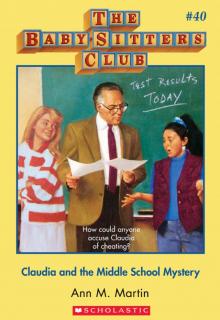 Claudia and the Middle School Mystery
Claudia and the Middle School Mystery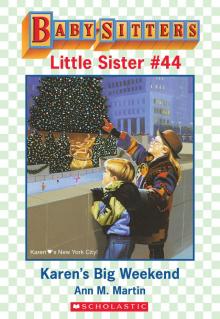 Karen's Big Weekend
Karen's Big Weekend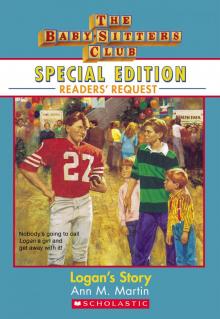 Logan's Story
Logan's Story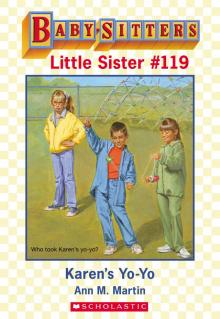 Karen's Yo-Yo
Karen's Yo-Yo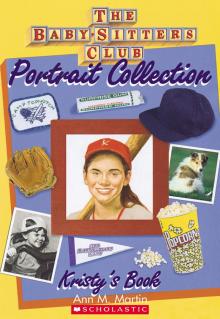 Kristy's Book
Kristy's Book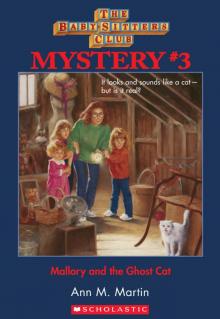 Mallory and the Ghost Cat
Mallory and the Ghost Cat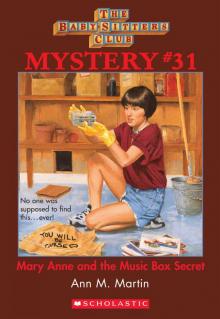 Mary Anne and the Music
Mary Anne and the Music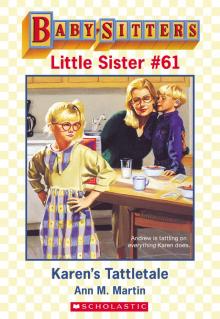 Karen's Tattletale
Karen's Tattletale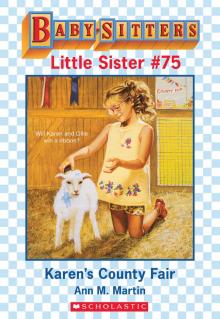 Karen's County Fair
Karen's County Fair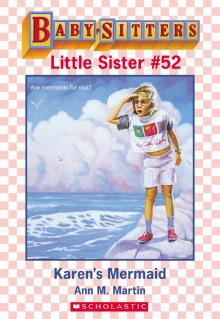 Karen's Mermaid
Karen's Mermaid Snowbound
Snowbound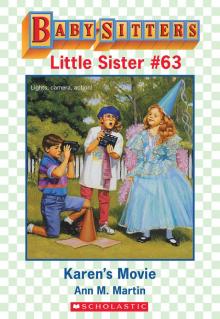 Karen's Movie
Karen's Movie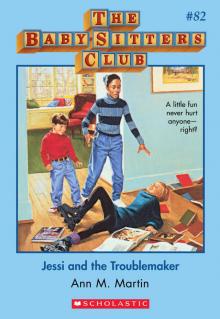 Jessi and the Troublemaker
Jessi and the Troublemaker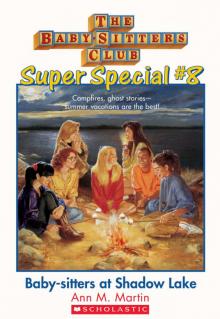 Baby-Sitters at Shadow Lake
Baby-Sitters at Shadow Lake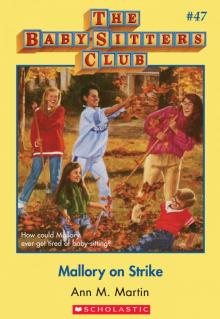 Mallory on Strike
Mallory on Strike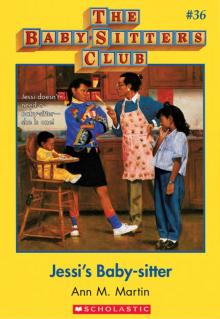 Jessi's Baby-Sitter
Jessi's Baby-Sitter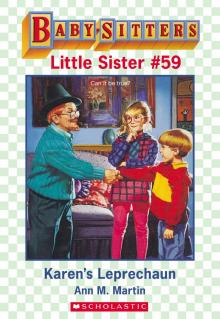 Karen's Leprechaun
Karen's Leprechaun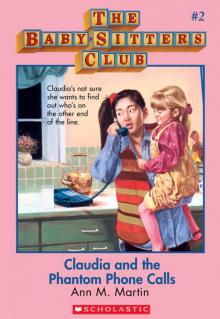 Claudia and the Phantom Phone Calls
Claudia and the Phantom Phone Calls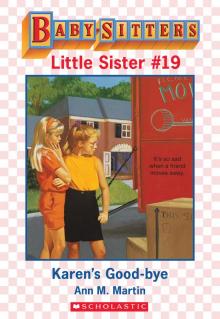 Karen's Good-Bye
Karen's Good-Bye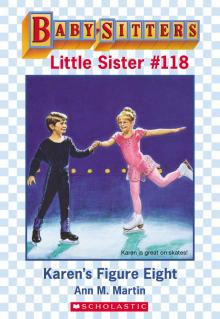 Karen's Figure Eight
Karen's Figure Eight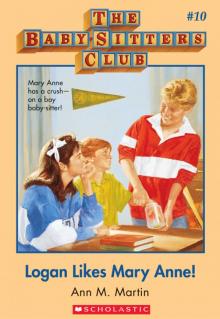 Logan Likes Mary Anne!
Logan Likes Mary Anne!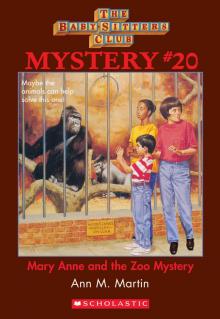 Mary Anne and the Zoo Mystery
Mary Anne and the Zoo Mystery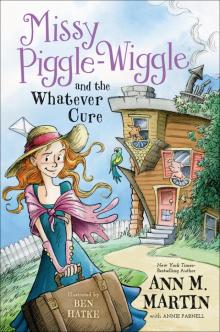 Missy Piggle-Wiggle and the Whatever Cure
Missy Piggle-Wiggle and the Whatever Cure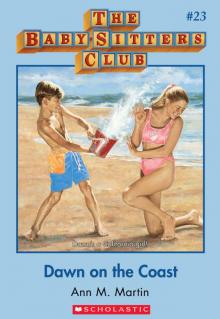 Dawn on the Coast
Dawn on the Coast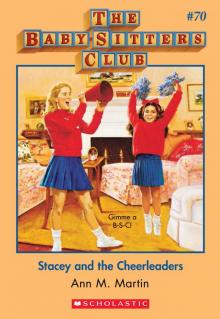 Stacey and the Cheerleaders
Stacey and the Cheerleaders Claudia and the Clue in the Photograph
Claudia and the Clue in the Photograph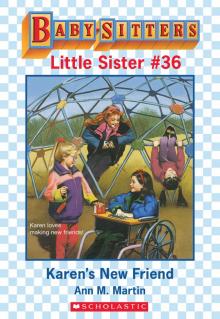 Karen's New Friend
Karen's New Friend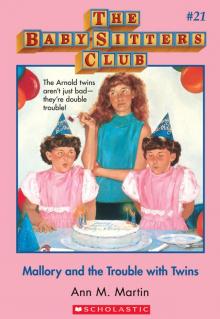 Mallory and the Trouble With Twins
Mallory and the Trouble With Twins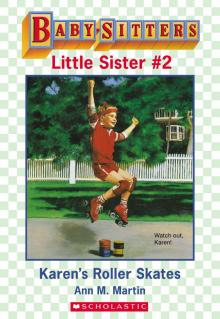 Karen's Roller Skates
Karen's Roller Skates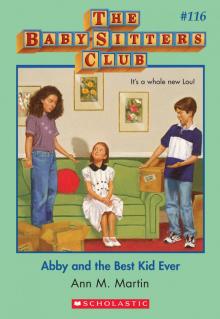 Abby and the Best Kid Ever
Abby and the Best Kid Ever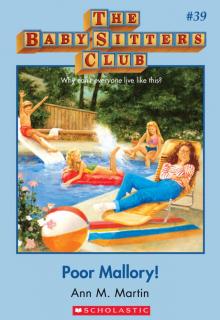 Poor Mallory!
Poor Mallory!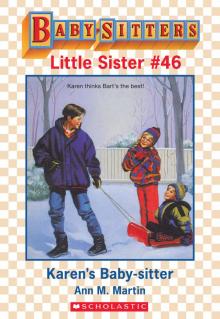 Karen's Witch
Karen's Witch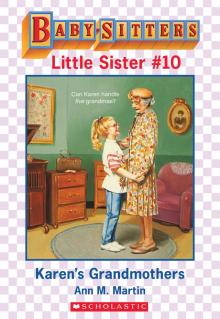 Karen's Grandmothers
Karen's Grandmothers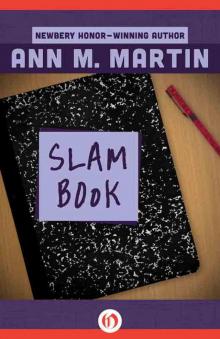 Slam Book
Slam Book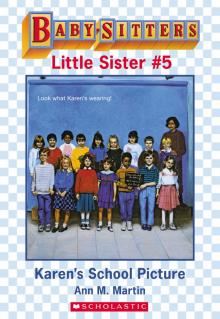 Karen's School Picture
Karen's School Picture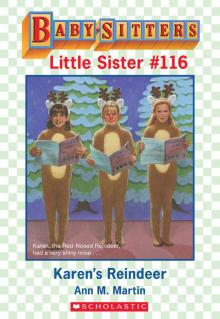 Karen's Reindeer
Karen's Reindeer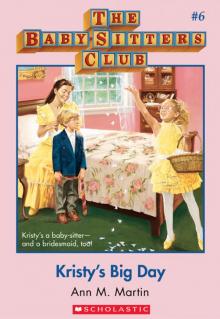 Kristy's Big Day
Kristy's Big Day The Long Way Home
The Long Way Home Karen's Sleigh Ride
Karen's Sleigh Ride On Christmas Eve
On Christmas Eve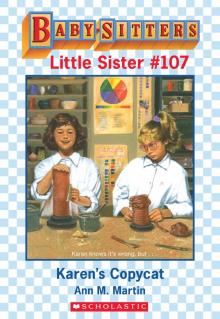 Karen's Copycat
Karen's Copycat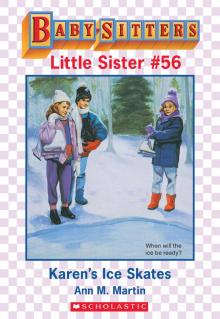 Karen's Ice Skates
Karen's Ice Skates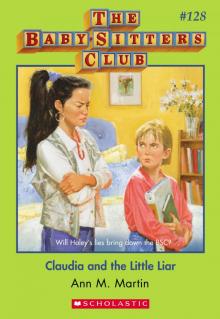 Claudia and the Little Liar
Claudia and the Little Liar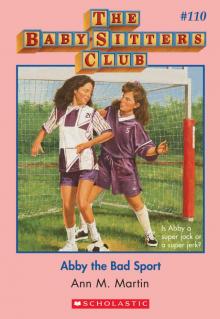 Abby the Bad Sport
Abby the Bad Sport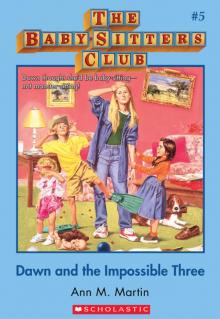 The Baby-Sitters Club #5: Dawn and the Impossible Three
The Baby-Sitters Club #5: Dawn and the Impossible Three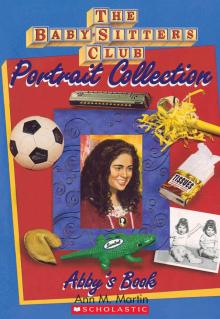 Abby's Book
Abby's Book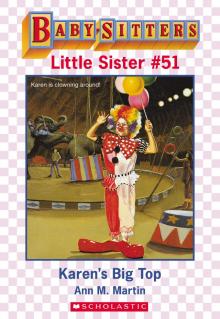 Karen's Big Top
Karen's Big Top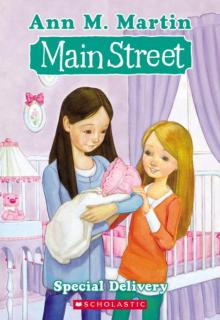 Main Street #8: Special Delivery
Main Street #8: Special Delivery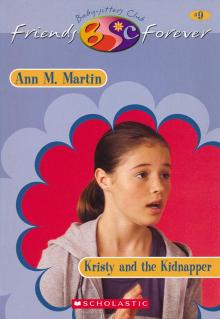 Kristy and the Kidnapper
Kristy and the Kidnapper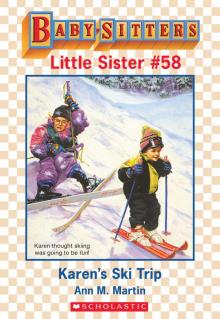 Karen's Ski Trip
Karen's Ski Trip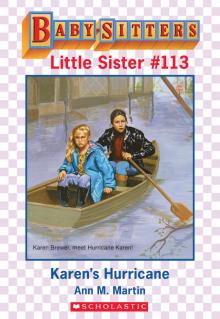 Karen's Hurricane
Karen's Hurricane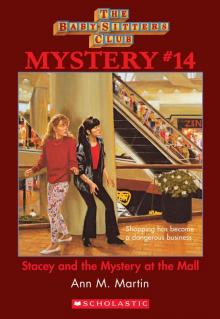 Stacey and the Mystery at the Mall
Stacey and the Mystery at the Mall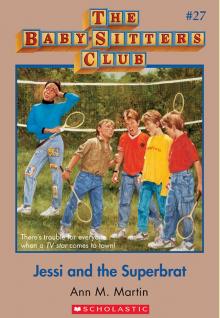 Jessi and the Superbrat
Jessi and the Superbrat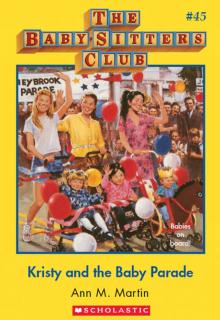 Kristy and the Baby Parade
Kristy and the Baby Parade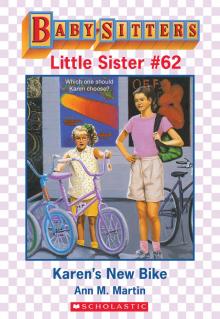 Karen's New Bike
Karen's New Bike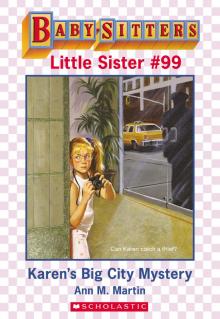 Karen's Big City Mystery
Karen's Big City Mystery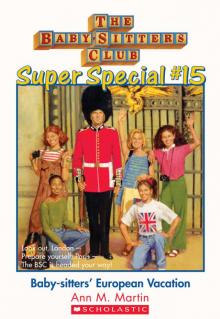 Baby-Sitters' European Vacation
Baby-Sitters' European Vacation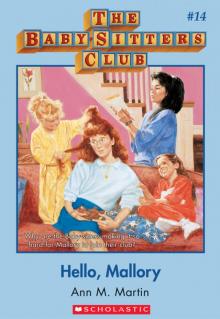 Hello, Mallory
Hello, Mallory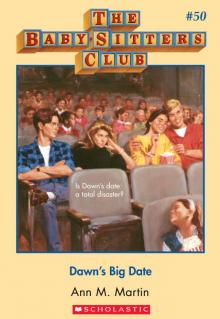 Dawn's Big Date
Dawn's Big Date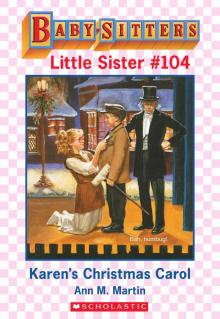 Karen's Christmas Carol
Karen's Christmas Carol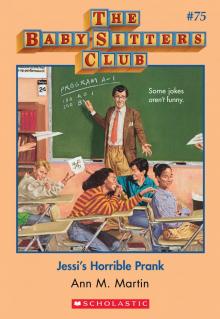 Jessi's Horrible Prank
Jessi's Horrible Prank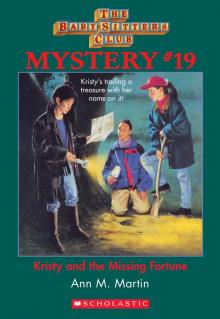 Kristy and the Missing Fortune
Kristy and the Missing Fortune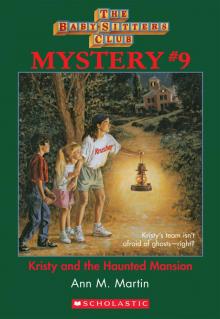 Kristy and the Haunted Mansion
Kristy and the Haunted Mansion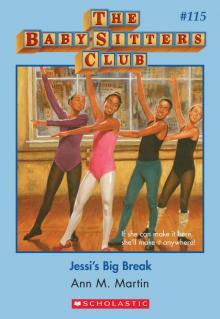 Jessi's Big Break
Jessi's Big Break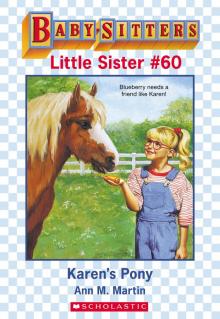 Karen's Pony
Karen's Pony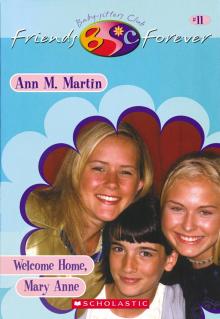 Welcome Home, Mary Anne
Welcome Home, Mary Anne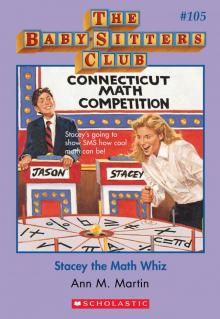 Stacey the Math Whiz
Stacey the Math Whiz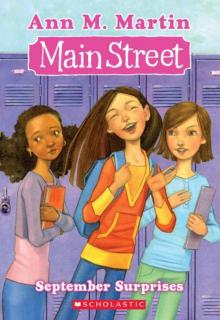 September Surprises
September Surprises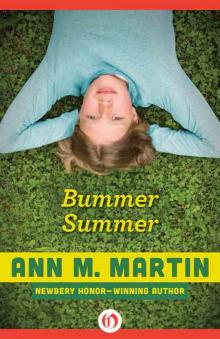 Bummer Summer
Bummer Summer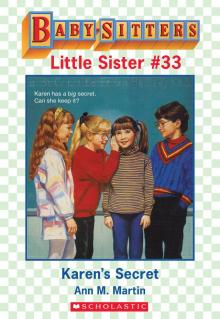 Karen's Secret
Karen's Secret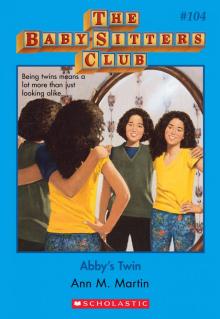 Abby's Twin
Abby's Twin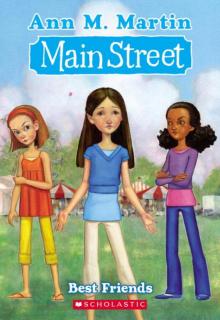 Main Street #4: Best Friends
Main Street #4: Best Friends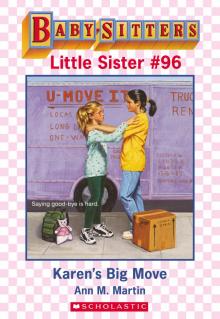 Karen's Big Move
Karen's Big Move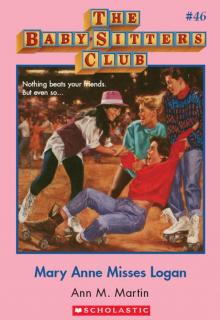 Mary Anne Misses Logan
Mary Anne Misses Logan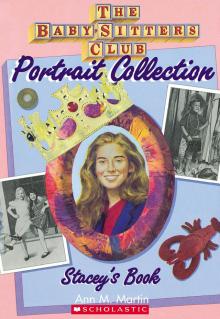 Stacey's Book
Stacey's Book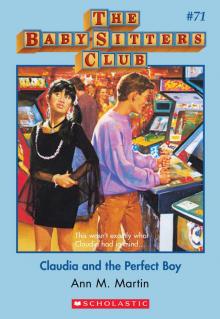 Claudia and the Perfect Boy
Claudia and the Perfect Boy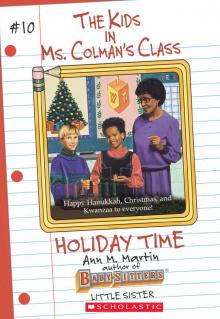 Holiday Time
Holiday Time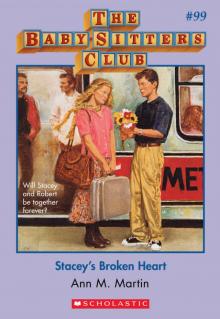 Stacey's Broken Heart
Stacey's Broken Heart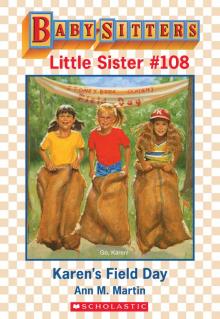 Karen's Field Day
Karen's Field Day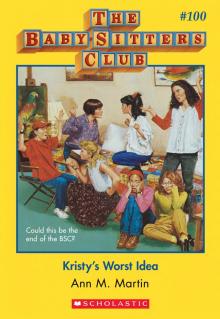 Kristy's Worst Idea
Kristy's Worst Idea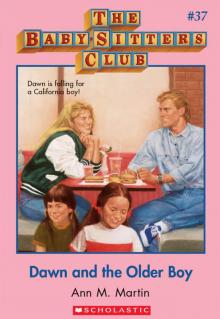 Dawn and the Older Boy
Dawn and the Older Boy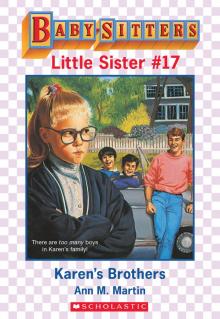 Karen's Brothers
Karen's Brothers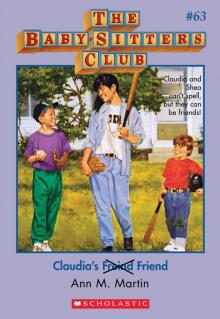 Claudia's Friend
Claudia's Friend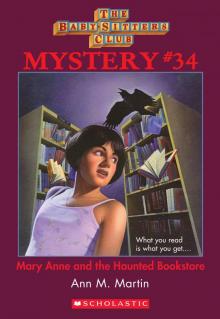 Mary Anne and the Haunted Bookstore
Mary Anne and the Haunted Bookstore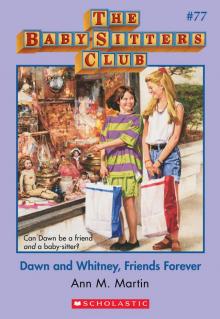 Dawn and Whitney, Friends Forever
Dawn and Whitney, Friends Forever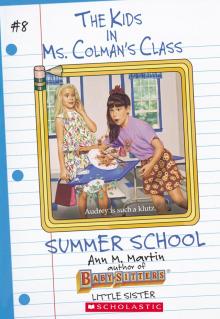 Summer School
Summer School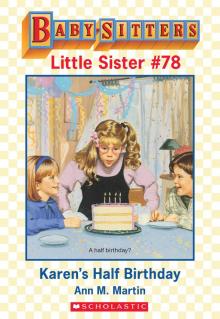 Karen's Birthday
Karen's Birthday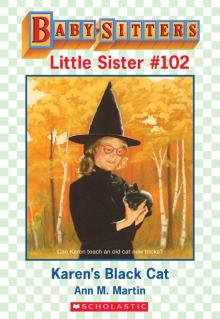 Karen's Black Cat
Karen's Black Cat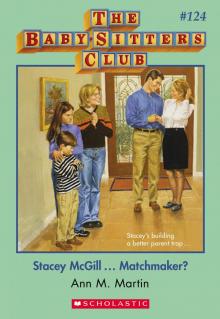 Stacey McGill... Matchmaker?
Stacey McGill... Matchmaker? Claudia's Book
Claudia's Book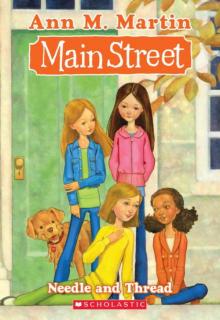 Main Street #2: Needle and Thread
Main Street #2: Needle and Thread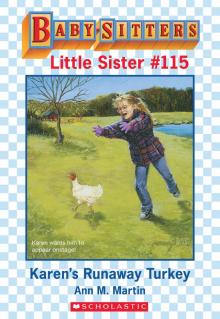 Karen's Runaway Turkey
Karen's Runaway Turkey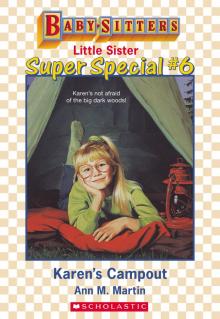 Karen's Campout
Karen's Campout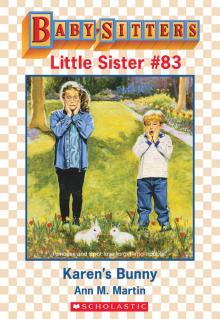 Karen's Bunny
Karen's Bunny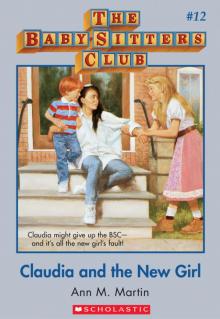 Claudia and the New Girl
Claudia and the New Girl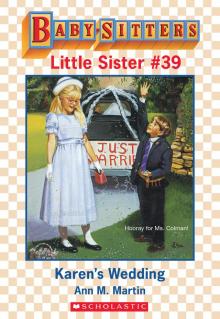 Karen's Wedding
Karen's Wedding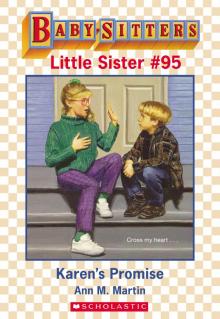 Karen's Promise
Karen's Promise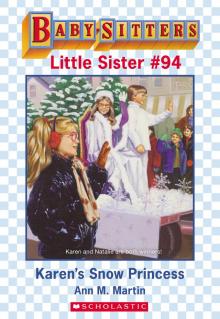 Karen's Snow Princess
Karen's Snow Princess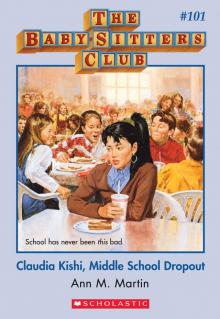 Claudia Kishi, Middle School Dropout
Claudia Kishi, Middle School Dropout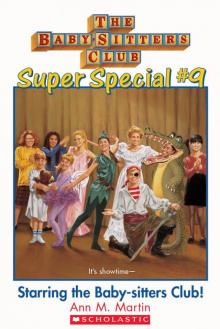 Starring the Baby-Sitters Club!
Starring the Baby-Sitters Club!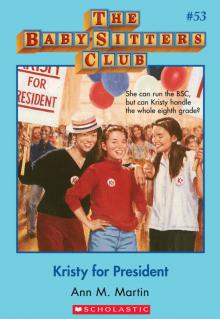 Kristy for President
Kristy for President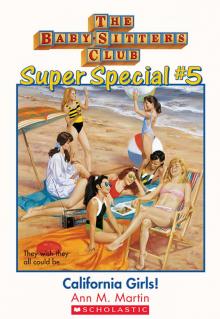 California Girls!
California Girls!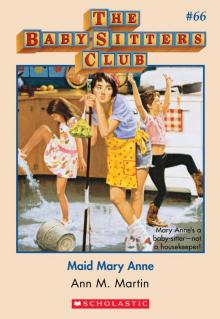 Maid Mary Anne
Maid Mary Anne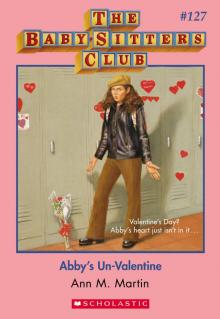 Abby's Un-Valentine
Abby's Un-Valentine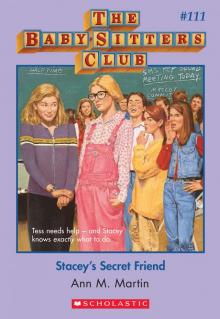 Stacey's Secret Friend
Stacey's Secret Friend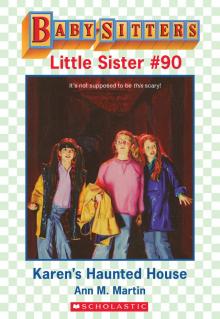 Karen's Haunted House
Karen's Haunted House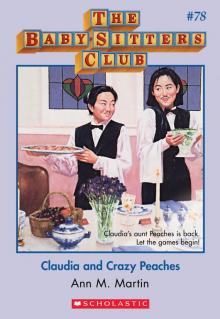 Claudia and Crazy Peaches
Claudia and Crazy Peaches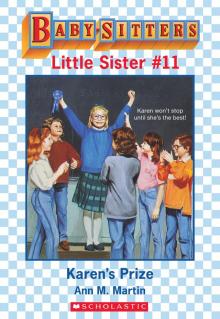 Karen's Prize
Karen's Prize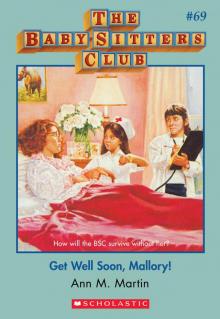 Get Well Soon, Mallory!
Get Well Soon, Mallory!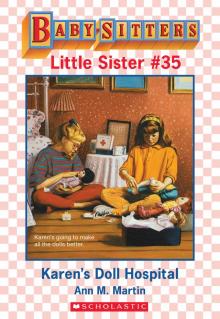 Karen's Doll Hospital
Karen's Doll Hospital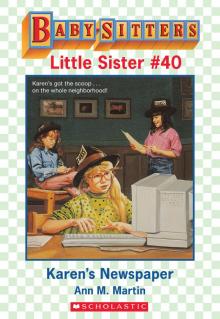 Karen's Newspaper
Karen's Newspaper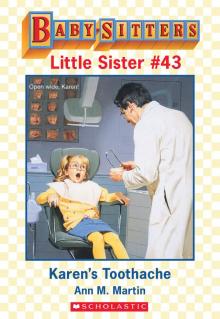 Karen's Toothache
Karen's Toothache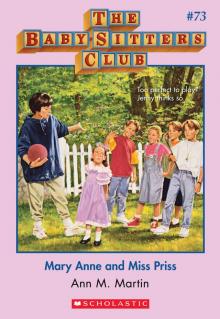 Mary Anne and Miss Priss
Mary Anne and Miss Priss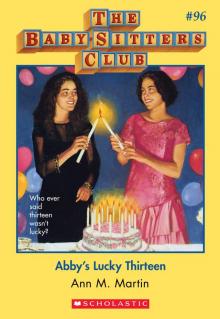 Abby's Lucky Thirteen
Abby's Lucky Thirteen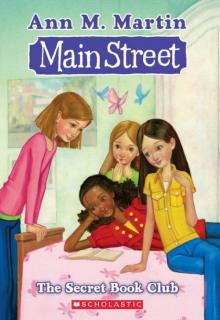 The Secret Book Club
The Secret Book Club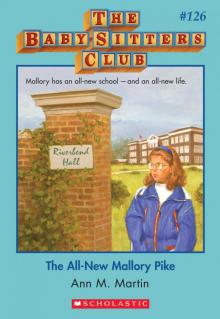 The All-New Mallory Pike
The All-New Mallory Pike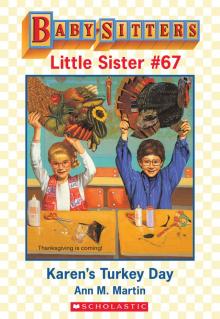 Karen's Turkey Day
Karen's Turkey Day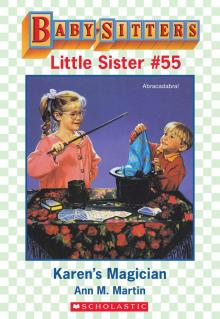 Karen's Magician
Karen's Magician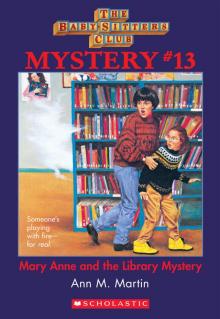 Mary Anne and the Library Mystery
Mary Anne and the Library Mystery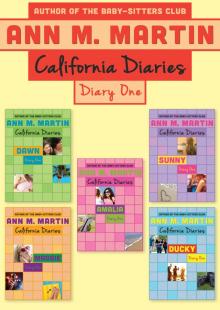 Diary One: Dawn, Sunny, Maggie, Amalia, and Ducky
Diary One: Dawn, Sunny, Maggie, Amalia, and Ducky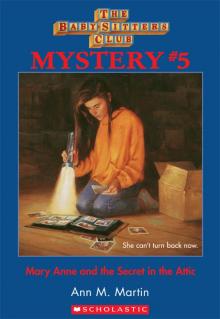 Mary Anne and the Secret in the Attic
Mary Anne and the Secret in the Attic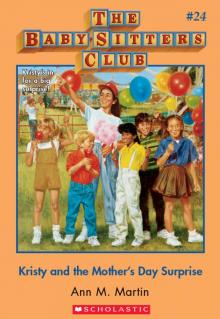 Kristy and the Mother's Day Surprise
Kristy and the Mother's Day Surprise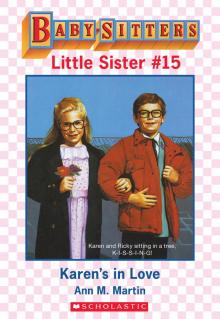 Karen's in Love
Karen's in Love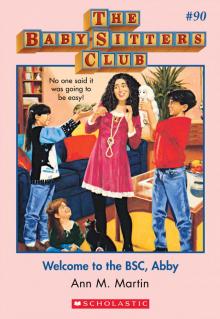 Welcome to the BSC, Abby
Welcome to the BSC, Abby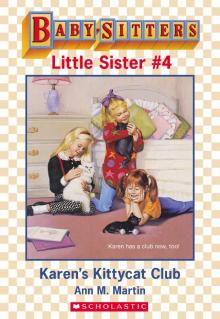 Karen's Kittycat Club
Karen's Kittycat Club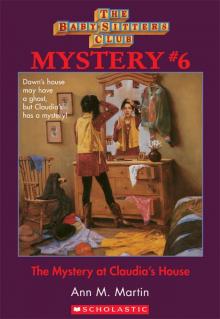 The Mystery at Claudia's House
The Mystery at Claudia's House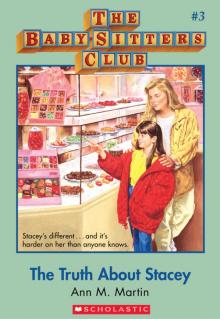 The Truth About Stacey
The Truth About Stacey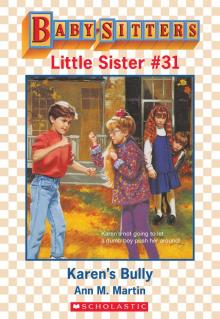 Karen's Bully
Karen's Bully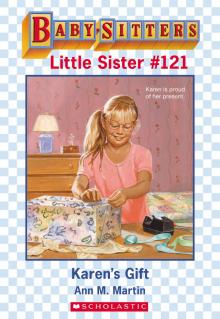 Karen's Gift
Karen's Gift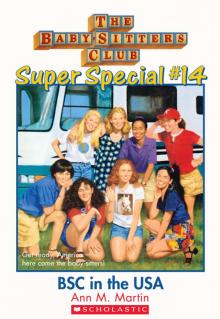 BSC in the USA
BSC in the USA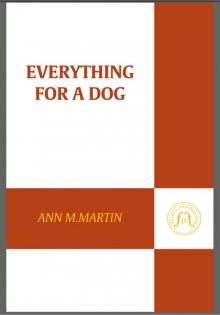 Everything for a Dog
Everything for a Dog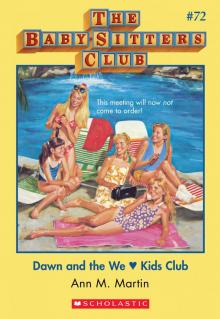 Dawn and the We Love Kids Club
Dawn and the We Love Kids Club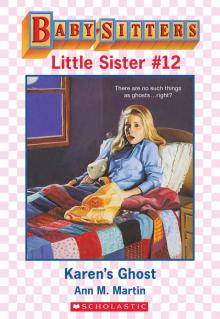 Karen's Ghost
Karen's Ghost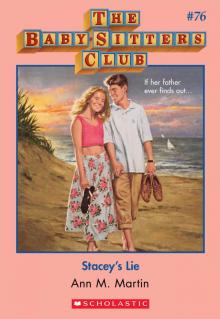 Stacey's Lie
Stacey's Lie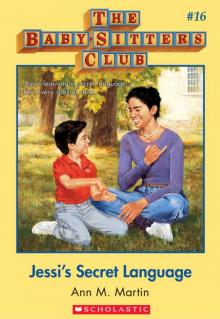 Jessi's Secret Language
Jessi's Secret Language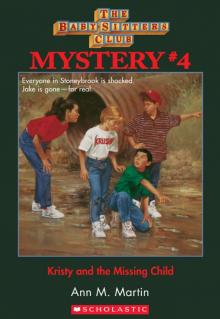 Kristy and the Missing Child
Kristy and the Missing Child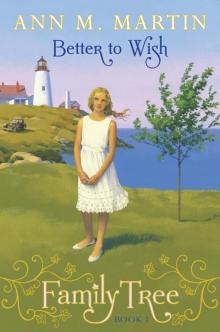 Better to Wish
Better to Wish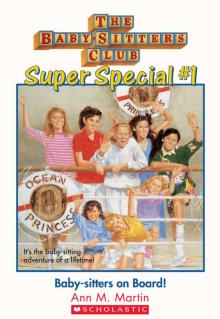 Baby-Sitters on Board!
Baby-Sitters on Board!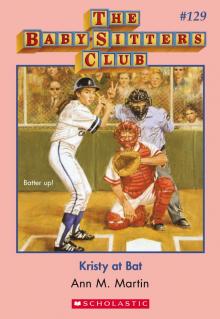 Kristy at Bat
Kristy at Bat Everything Changes
Everything Changes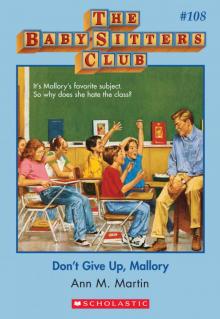 Don't Give Up, Mallory
Don't Give Up, Mallory A Dog's Life: The Autobiography of a Stray
A Dog's Life: The Autobiography of a Stray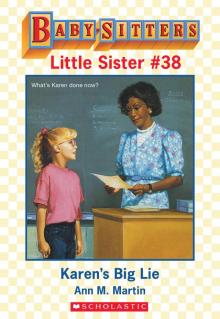 Karen's Big Lie
Karen's Big Lie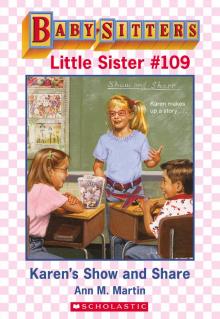 Karen's Show and Share
Karen's Show and Share Mallory Hates Boys (and Gym)
Mallory Hates Boys (and Gym)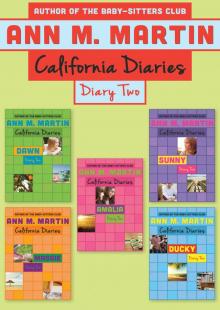 Diary Two: Dawn, Sunny, Maggie, Amalia, and Ducky
Diary Two: Dawn, Sunny, Maggie, Amalia, and Ducky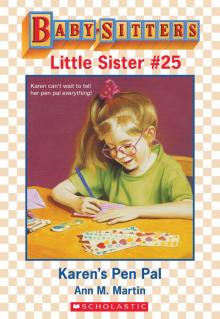 Karen's Pen Pal
Karen's Pen Pal Claudia and the Friendship Feud
Claudia and the Friendship Feud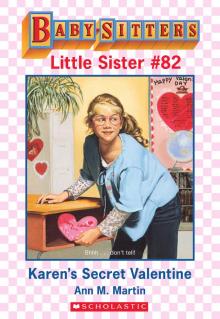 Karen's Secret Valentine
Karen's Secret Valentine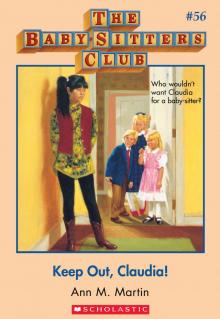 Keep Out, Claudia!
Keep Out, Claudia! Aloha, Baby-Sitters!
Aloha, Baby-Sitters!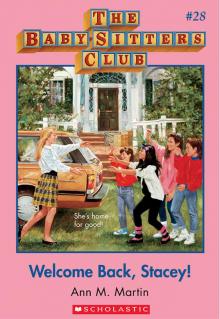 Welcome Back, Stacey
Welcome Back, Stacey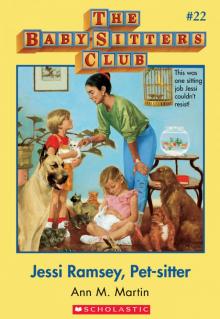 Jessi Ramsey, Pet-Sitter
Jessi Ramsey, Pet-Sitter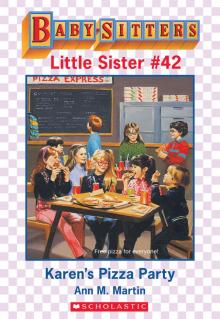 Karen's Pizza Party
Karen's Pizza Party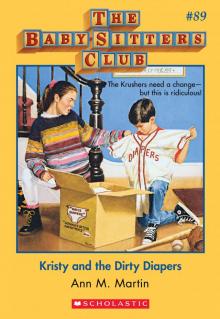 Kristy and the Dirty Diapers
Kristy and the Dirty Diapers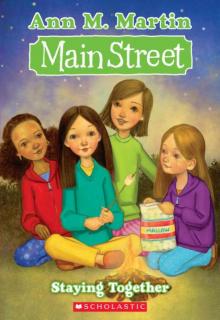 Staying Together
Staying Together Dawn and the Surfer Ghost
Dawn and the Surfer Ghost Claudia Makes Up Her Mind
Claudia Makes Up Her Mind Jessi's Gold Medal
Jessi's Gold Medal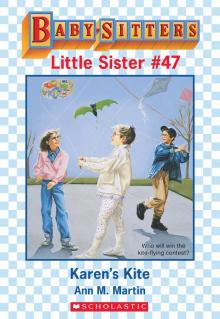 Karen's Kite
Karen's Kite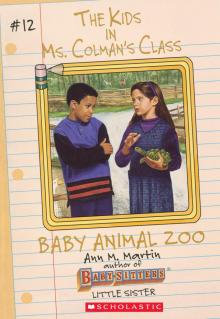 Baby Animal Zoo
Baby Animal Zoo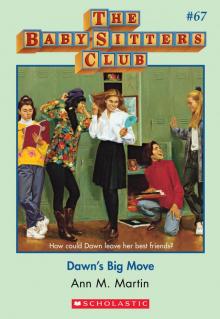 Dawn's Big Move
Dawn's Big Move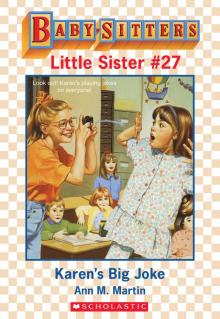 Karen's Big Joke
Karen's Big Joke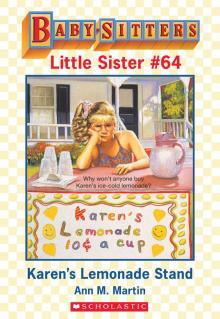 Karen's Lemonade Stand
Karen's Lemonade Stand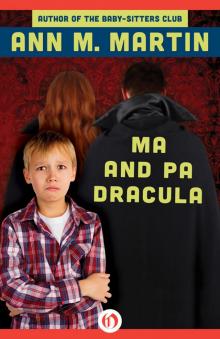 Ma and Pa Dracula
Ma and Pa Dracula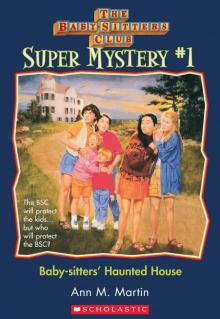 Baby-Sitters' Haunted House
Baby-Sitters' Haunted House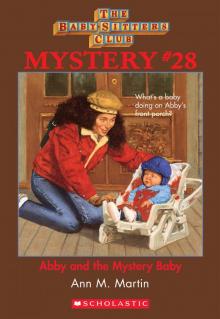 Abby and the Mystery Baby
Abby and the Mystery Baby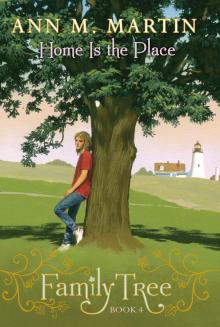 Home Is the Place
Home Is the Place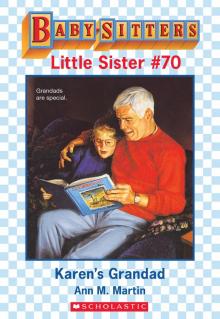 Karen's Grandad
Karen's Grandad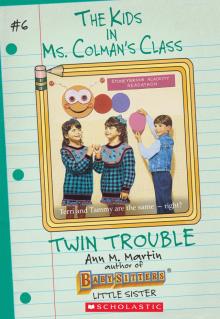 Twin Trouble
Twin Trouble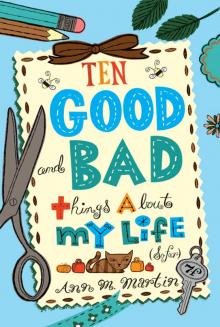 Ten Good and Bad Things About My Life (So Far)
Ten Good and Bad Things About My Life (So Far)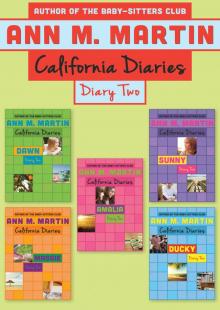 Diary Two
Diary Two Baby-Sitters Club 027
Baby-Sitters Club 027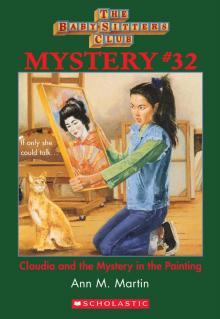 Claudia and the Mystery Painting
Claudia and the Mystery Painting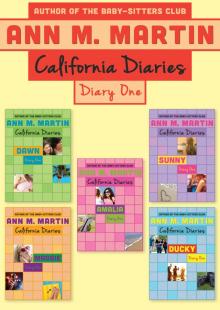 Diary One
Diary One Baby-Sitters Club 037
Baby-Sitters Club 037 Baby-Sitters Club 028
Baby-Sitters Club 028 Baby-Sitters Club 085
Baby-Sitters Club 085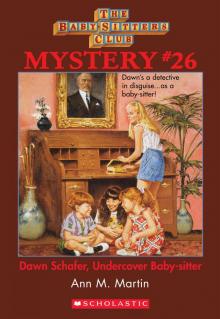 Dawn Schaffer Undercover Baby-Sitter
Dawn Schaffer Undercover Baby-Sitter Jessi's Babysitter
Jessi's Babysitter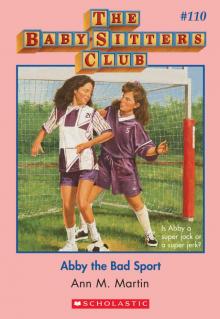 The Baby-Sitters Club #110: Abby the Bad Sport (Baby-Sitters Club, The)
The Baby-Sitters Club #110: Abby the Bad Sport (Baby-Sitters Club, The) Karen's Little Sister
Karen's Little Sister Baby-Sitters Club 058
Baby-Sitters Club 058 Claudia And The Genius On Elm St.
Claudia And The Genius On Elm St.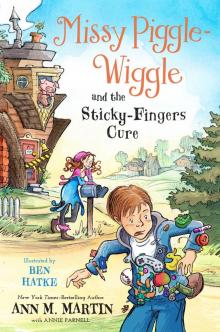 Missy Piggle-Wiggle and the Sticky-Fingers Cure
Missy Piggle-Wiggle and the Sticky-Fingers Cure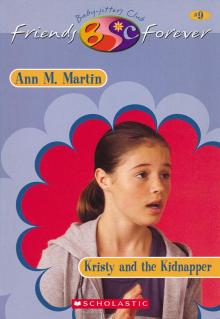 Kristy and Kidnapper
Kristy and Kidnapper Baby-Sitters Club 041
Baby-Sitters Club 041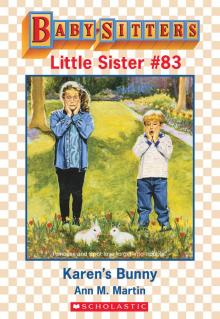 Karen's Bunny Trouble
Karen's Bunny Trouble Baby-Sitters Club 032
Baby-Sitters Club 032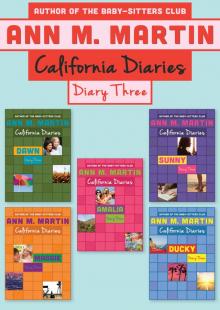 Diary Three
Diary Three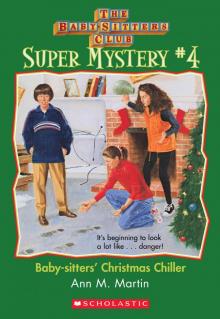 Christmas Chiller
Christmas Chiller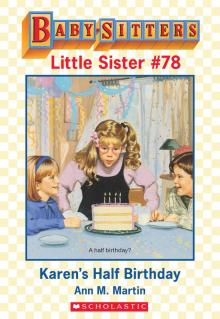 Karen's Half-Birthday
Karen's Half-Birthday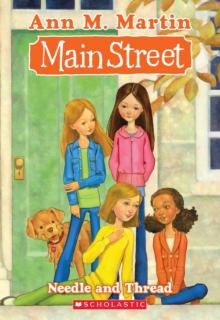 Needle and Thread
Needle and Thread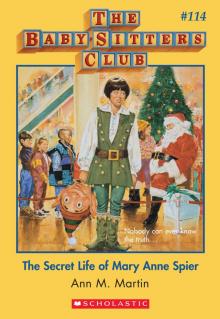 Secret Life of Mary Anne Spier
Secret Life of Mary Anne Spier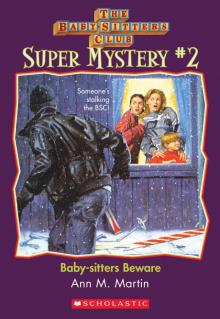 Baby-Sitters Beware
Baby-Sitters Beware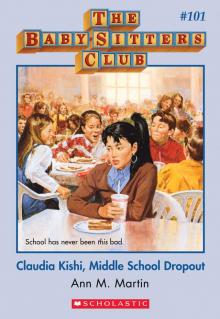 Claudia Kishi, Middle School Drop-Out
Claudia Kishi, Middle School Drop-Out Logan Likes Mary Anne !
Logan Likes Mary Anne ! Baby-Sitters Club 061
Baby-Sitters Club 061 Best Friends
Best Friends Baby-Sitters Club 031
Baby-Sitters Club 031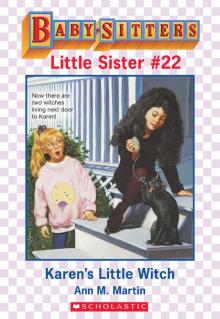 Karen's Little Witch
Karen's Little Witch Jessi Ramsey, Petsitter
Jessi Ramsey, Petsitter Baby-Sitters Club 123
Baby-Sitters Club 123 Baby-Sitters Club 059
Baby-Sitters Club 059 Baby-Sitters Club 033
Baby-Sitters Club 033 Baby-Sitters Club 060
Baby-Sitters Club 060 Baby-Sitters Club 094
Baby-Sitters Club 094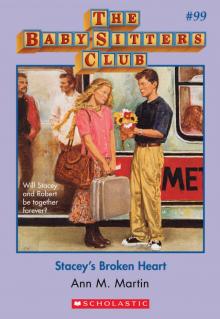 The Baby-Sitters Club #99: Stacey's Broken Heart
The Baby-Sitters Club #99: Stacey's Broken Heart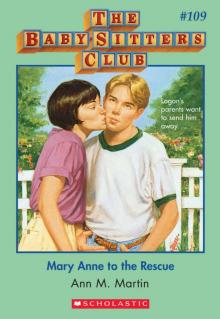 The Baby-Sitters Club #109: Mary Anne to the Rescue (Baby-Sitters Club, The)
The Baby-Sitters Club #109: Mary Anne to the Rescue (Baby-Sitters Club, The) Mystery At Claudia's House
Mystery At Claudia's House Claudia And The Sad Goodbye
Claudia And The Sad Goodbye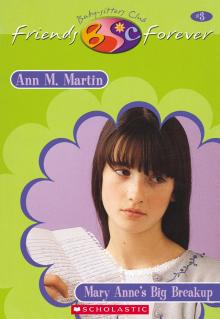 Mary Anne's Big Break-Up
Mary Anne's Big Break-Up Baby-Sitters Club 025
Baby-Sitters Club 025 Baby-Sitters Club 042
Baby-Sitters Club 042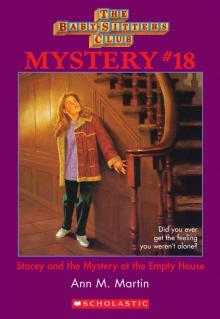 Stacey and the Mystery of the Empty House
Stacey and the Mystery of the Empty House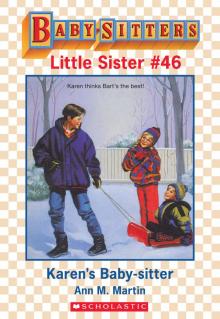 Karen's Baby-Sitter
Karen's Baby-Sitter Claudia's Friendship Feud
Claudia's Friendship Feud Baby-Sitters Club 090
Baby-Sitters Club 090 Baby-Sitters Club 021
Baby-Sitters Club 021 Baby-Sitters Club 056
Baby-Sitters Club 056 Baby-Sitters Club 040
Baby-Sitters Club 040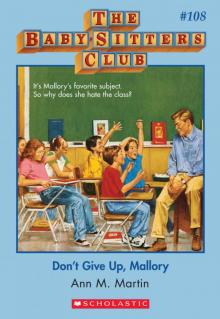 The Baby-Sitters Club #108: Don't Give Up, Mallory (Baby-Sitters Club, The)
The Baby-Sitters Club #108: Don't Give Up, Mallory (Baby-Sitters Club, The)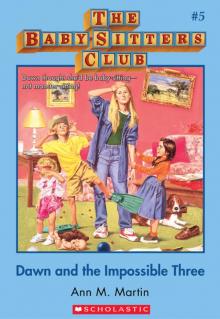 Dawn and the Impossible Three
Dawn and the Impossible Three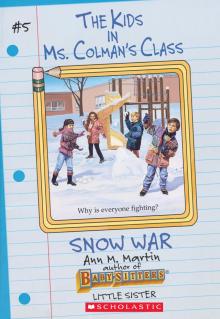 The Snow War
The Snow War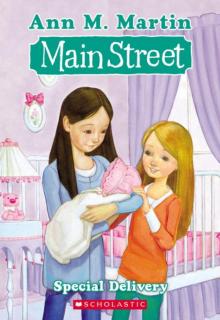 Special Delivery
Special Delivery Baby-Sitters Club 057
Baby-Sitters Club 057 Mary Anne And Too Many Babies
Mary Anne And Too Many Babies Baby-Sitters Club 030
Baby-Sitters Club 030